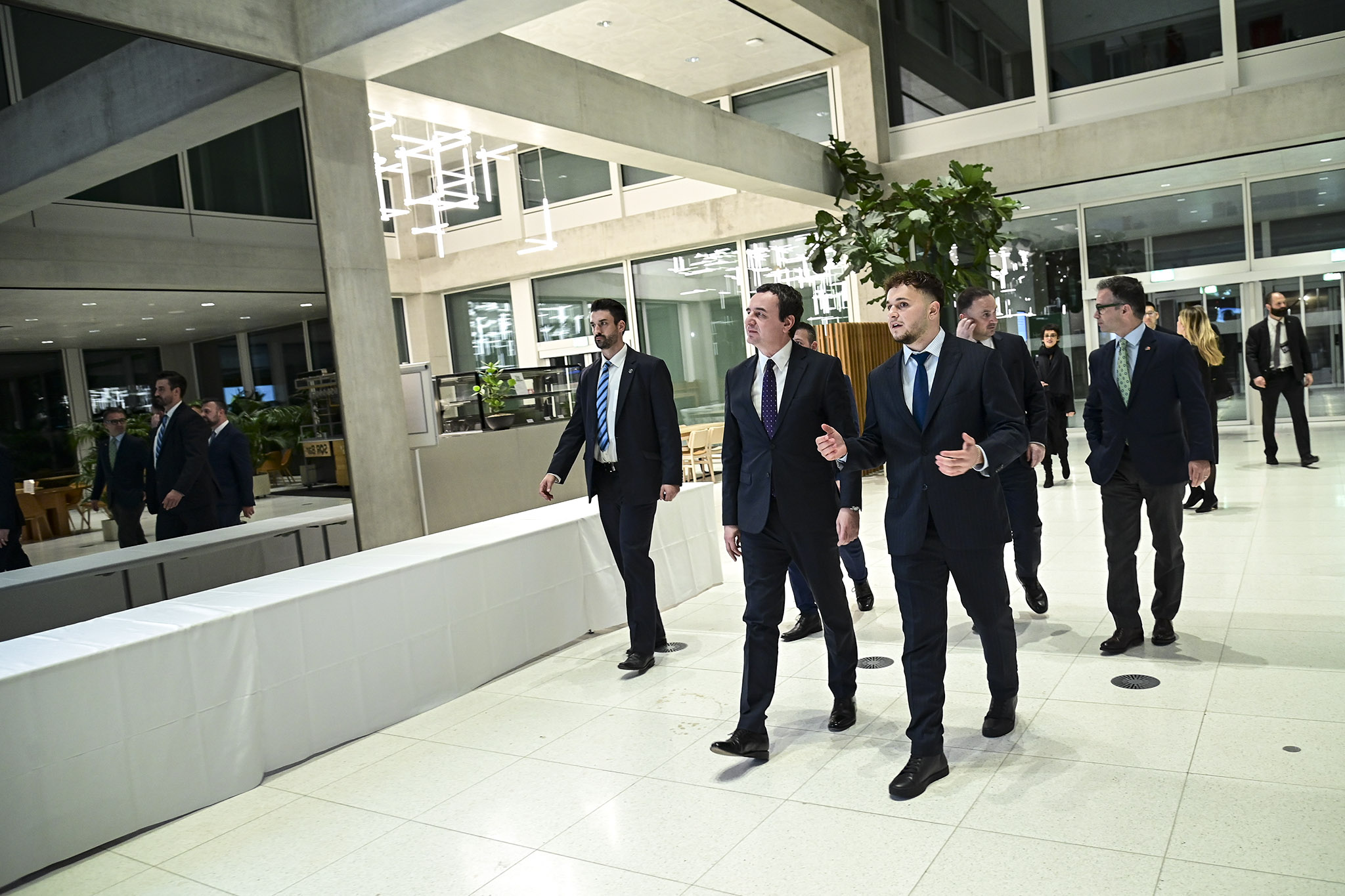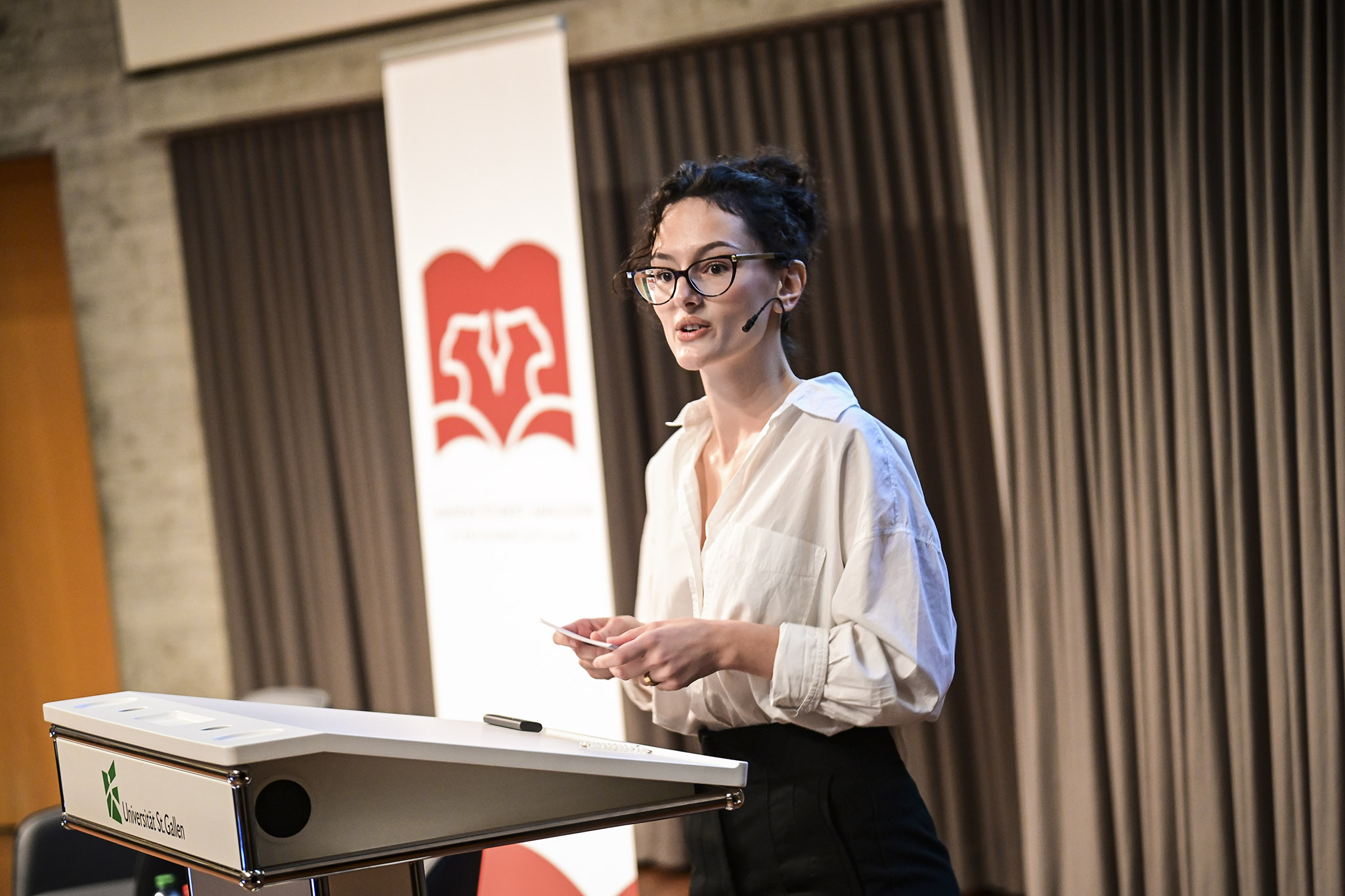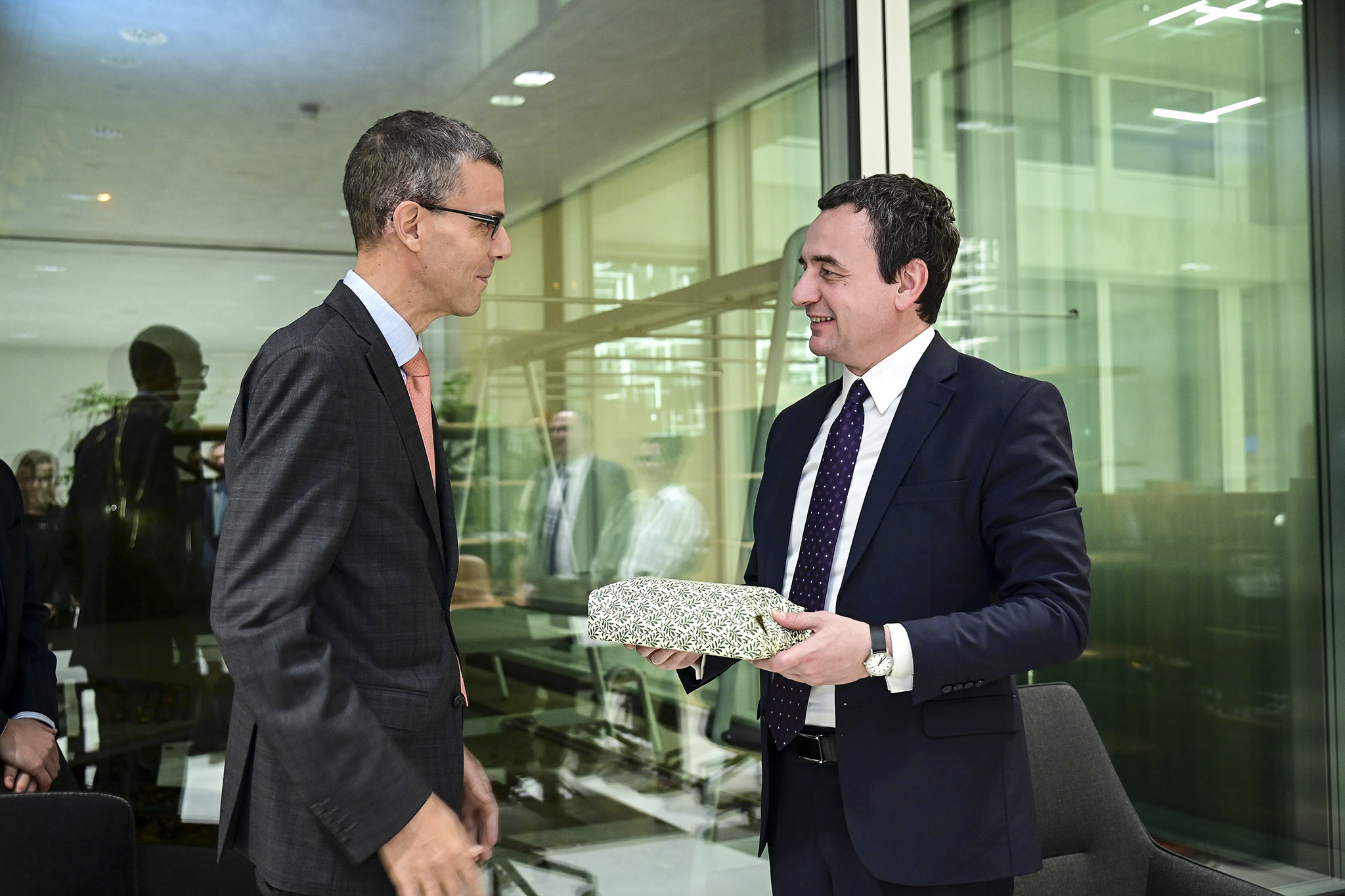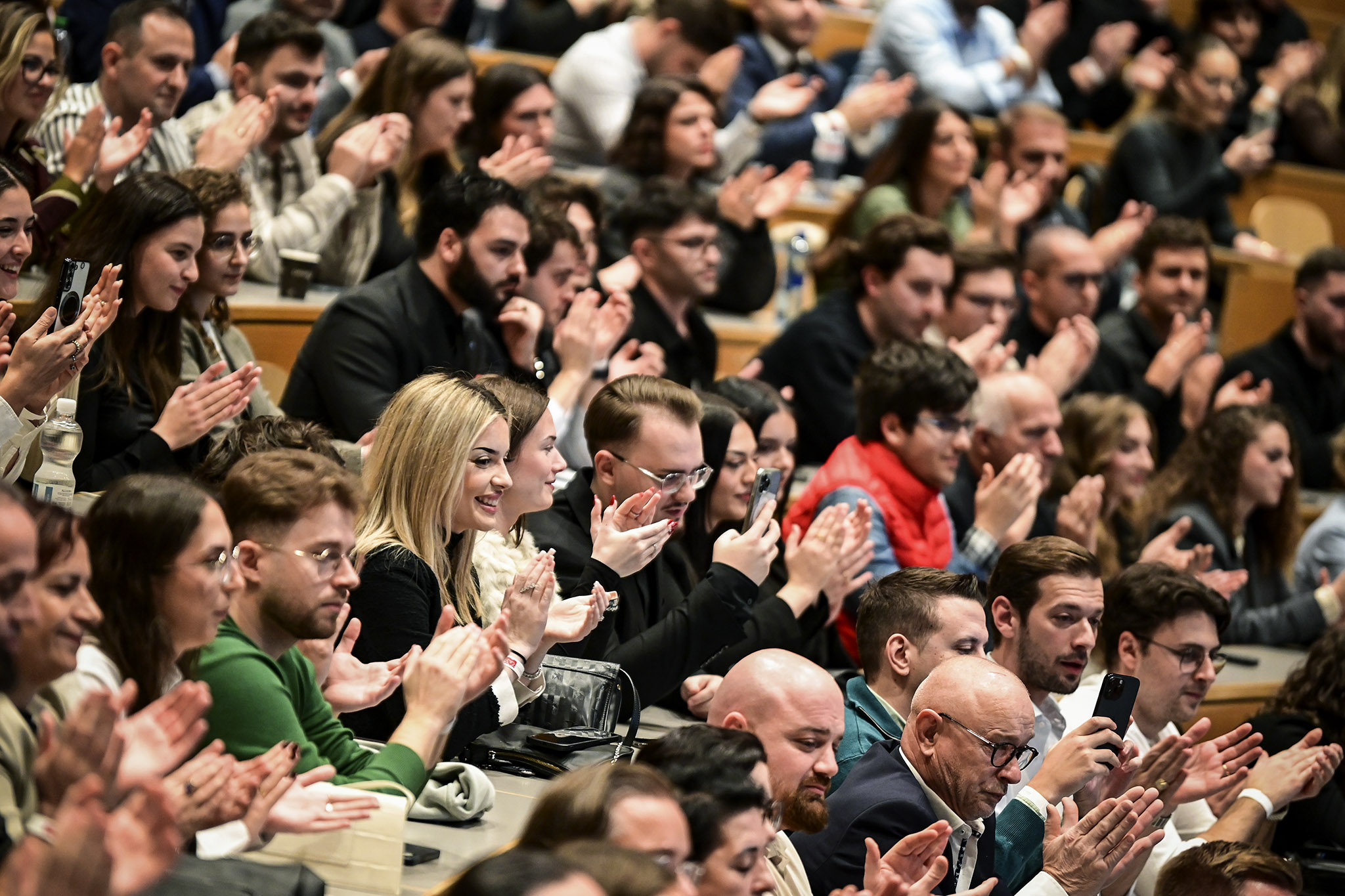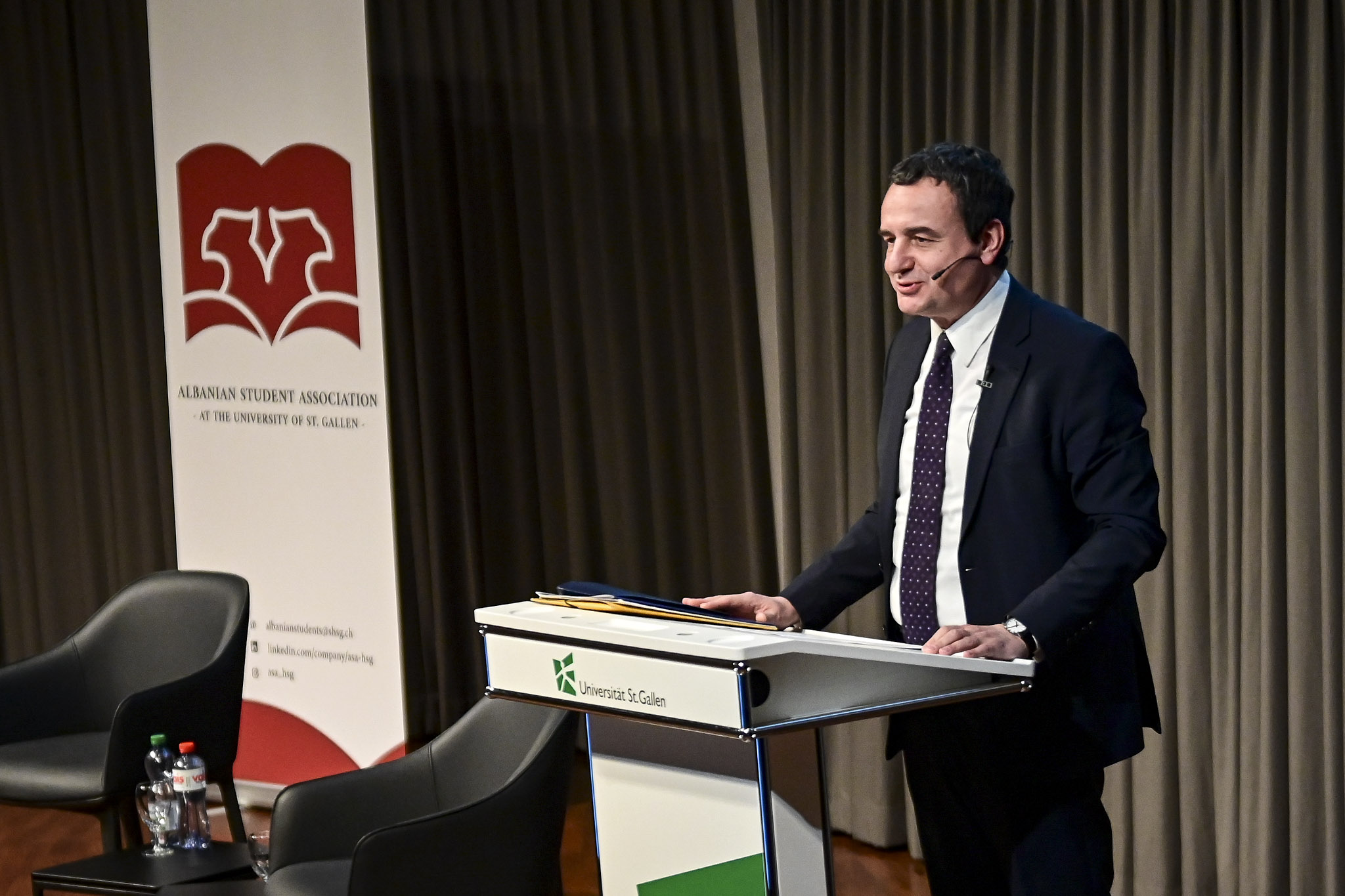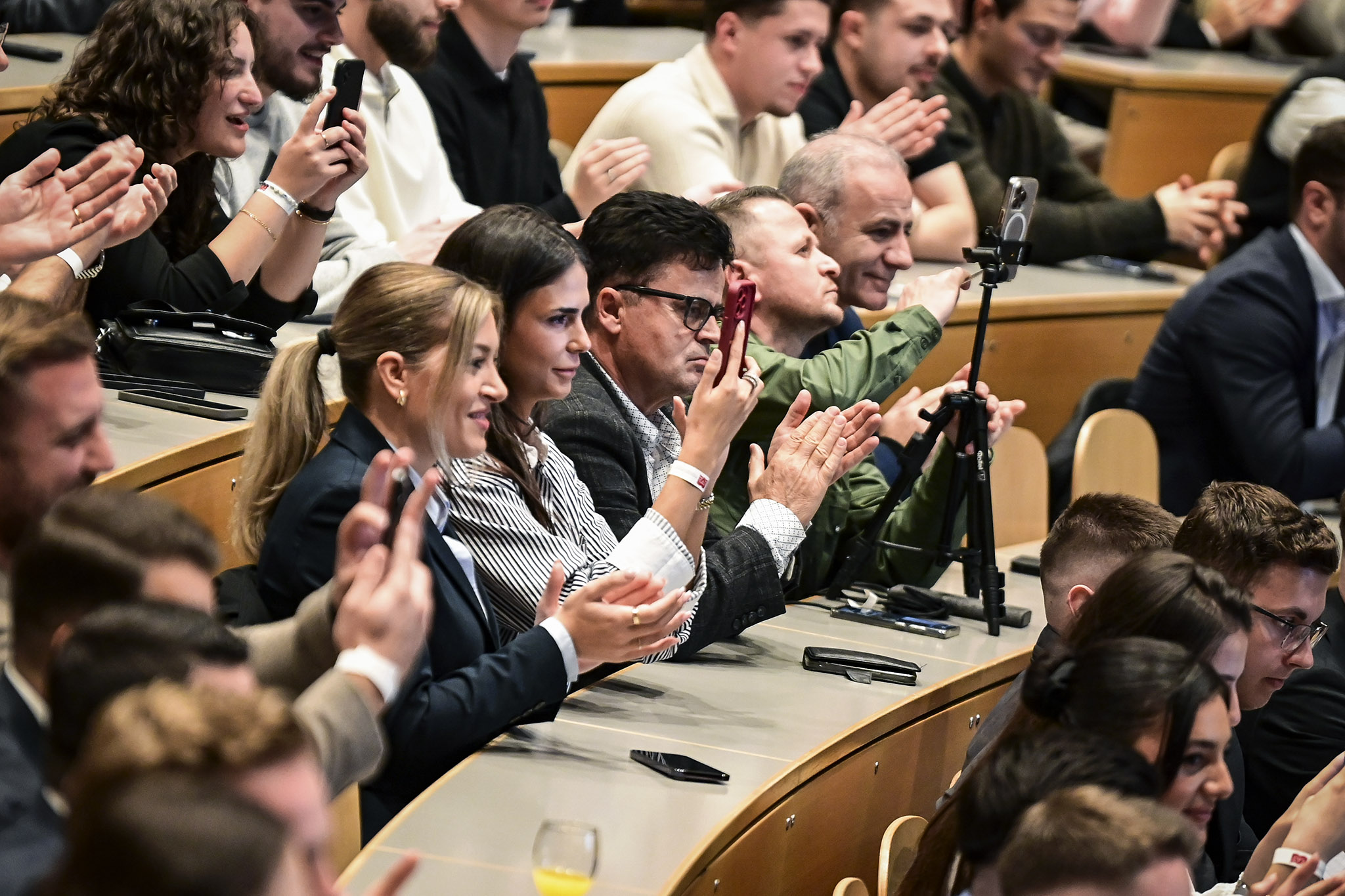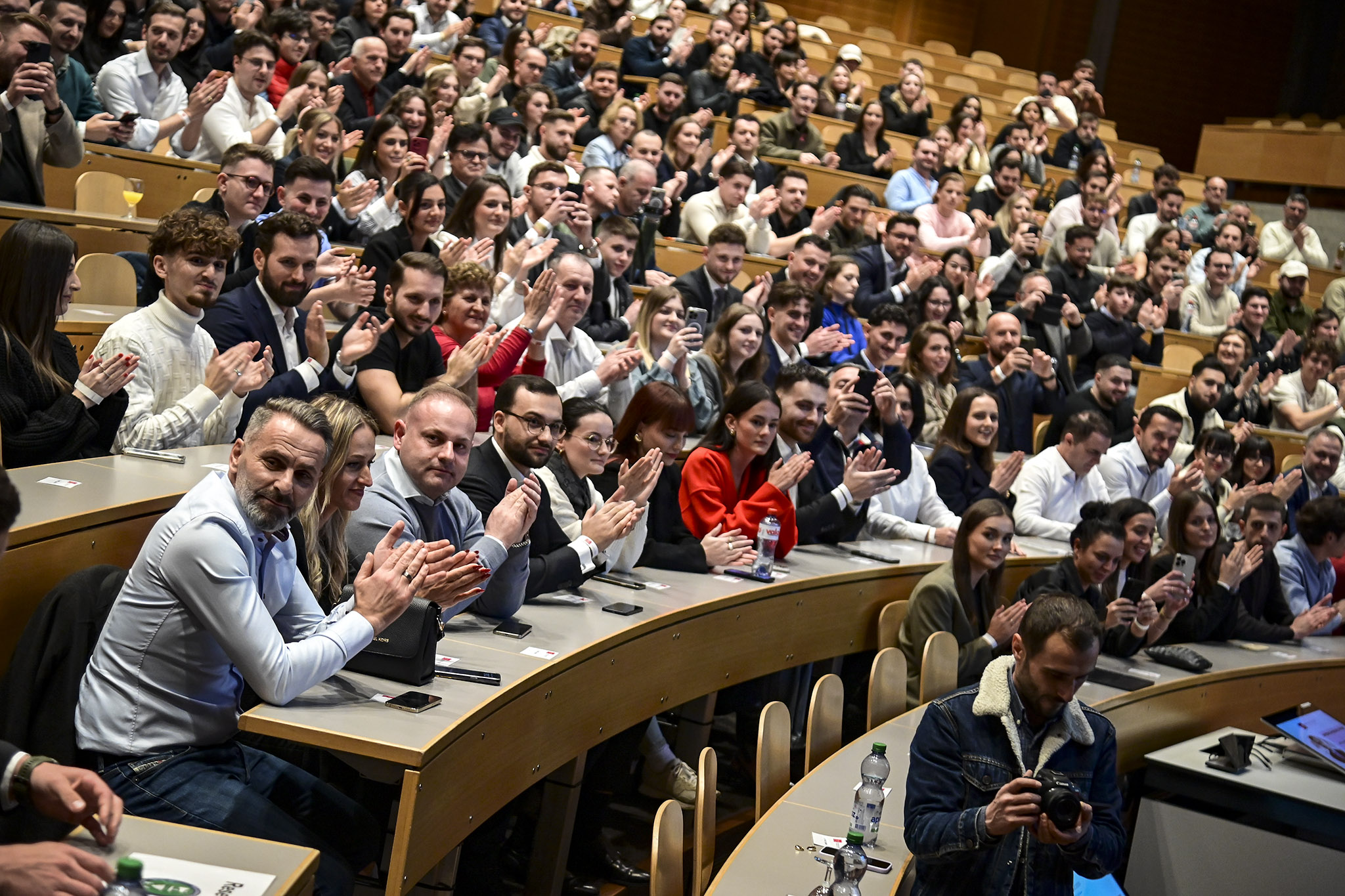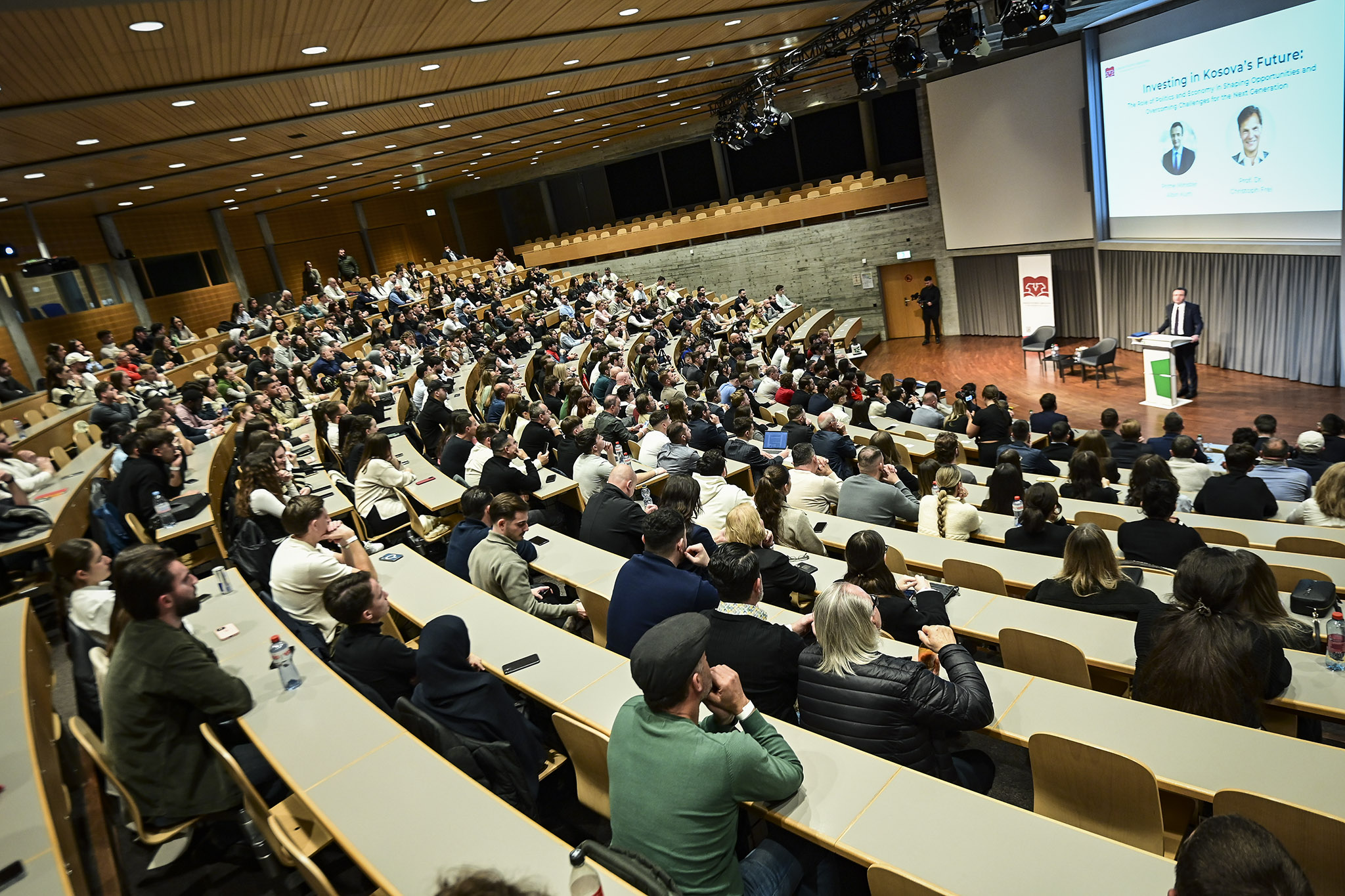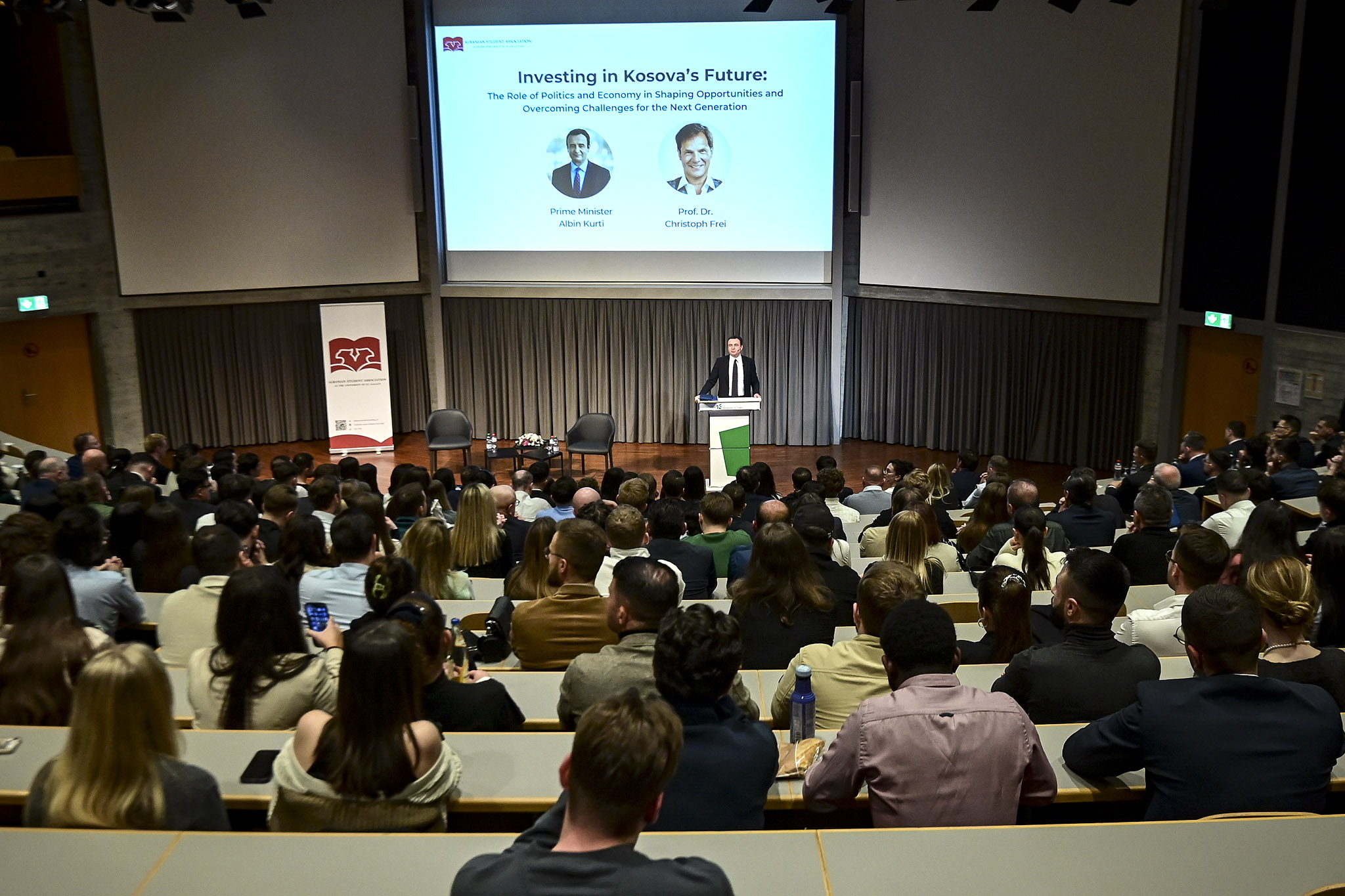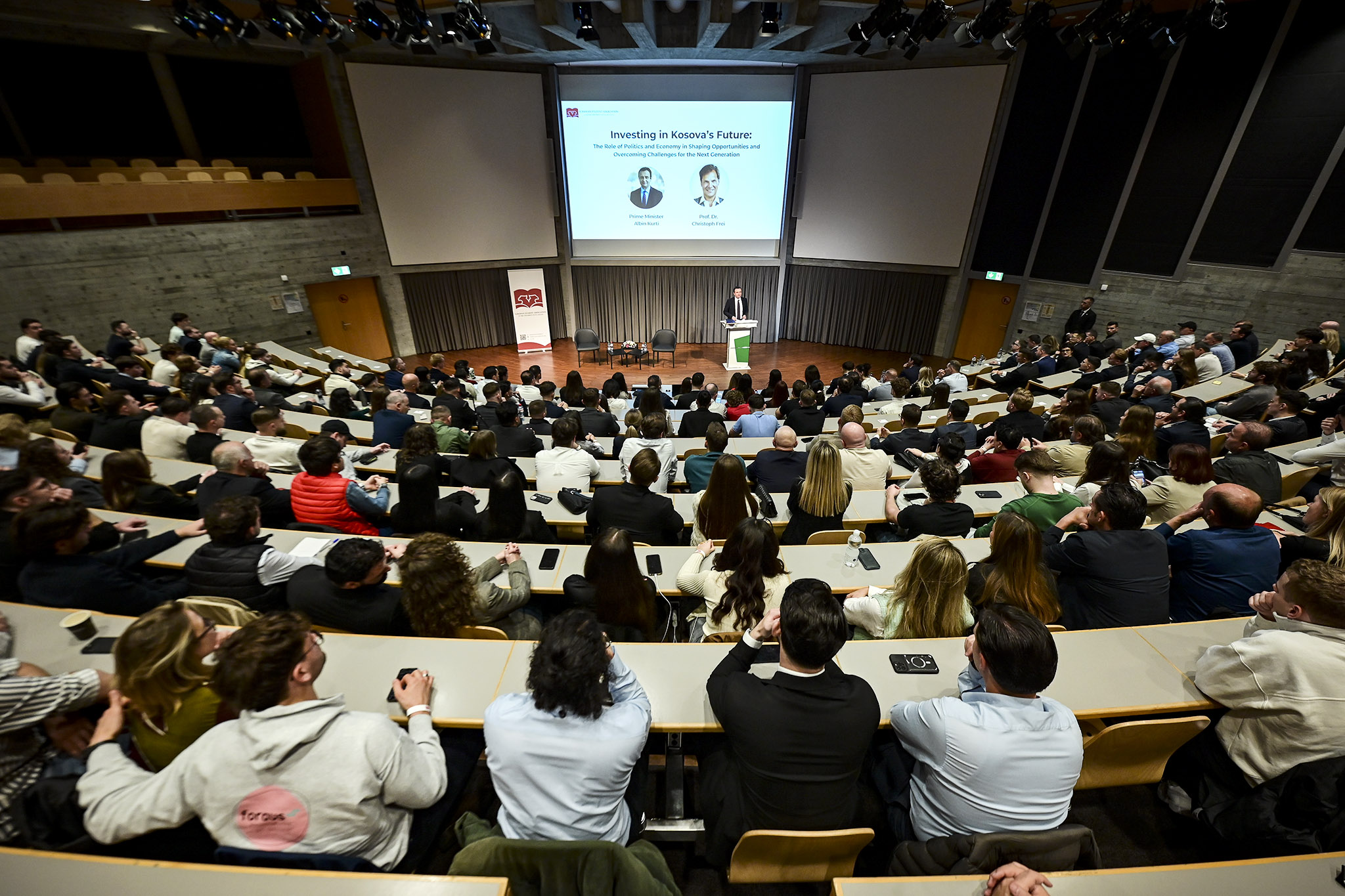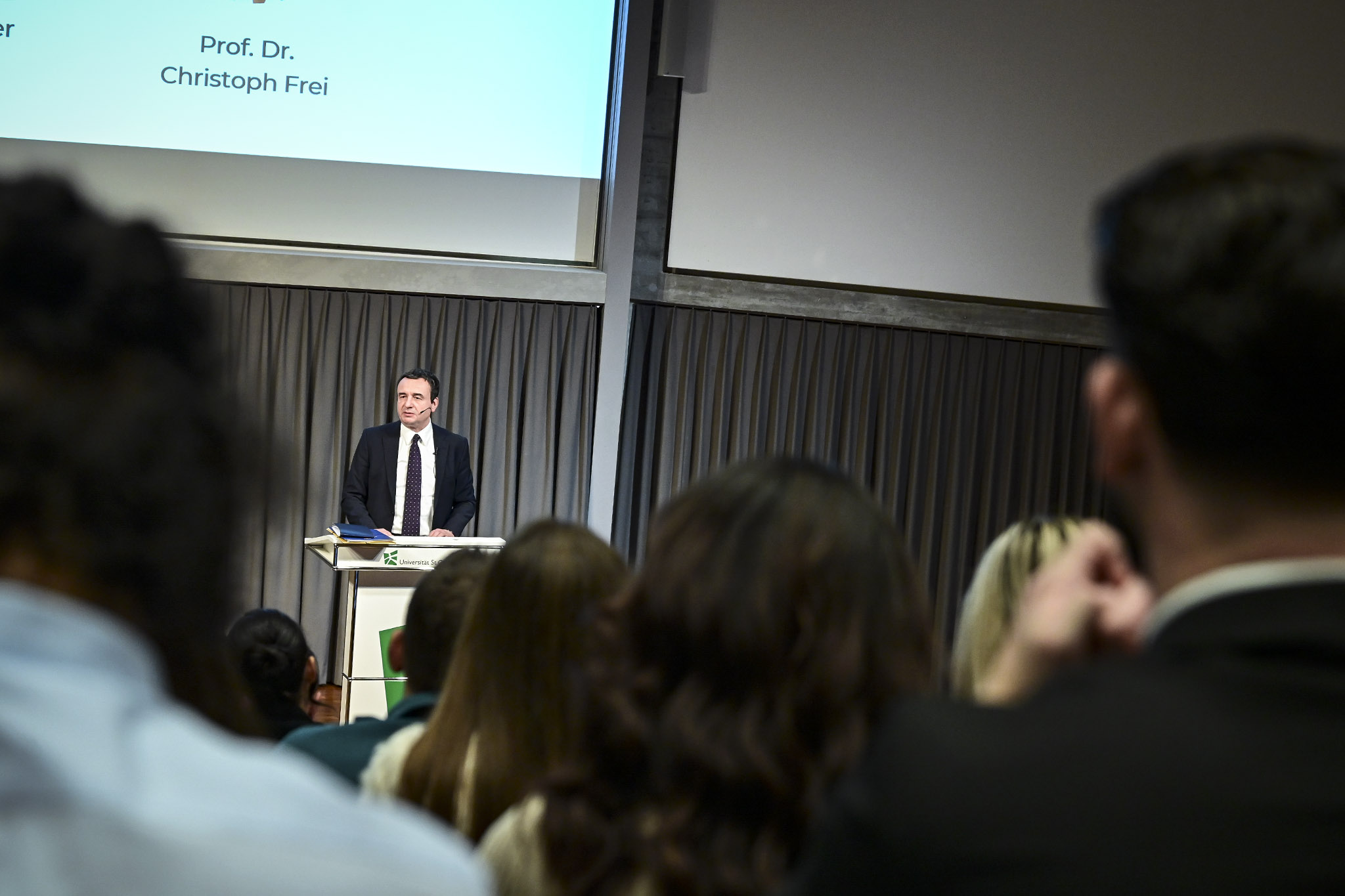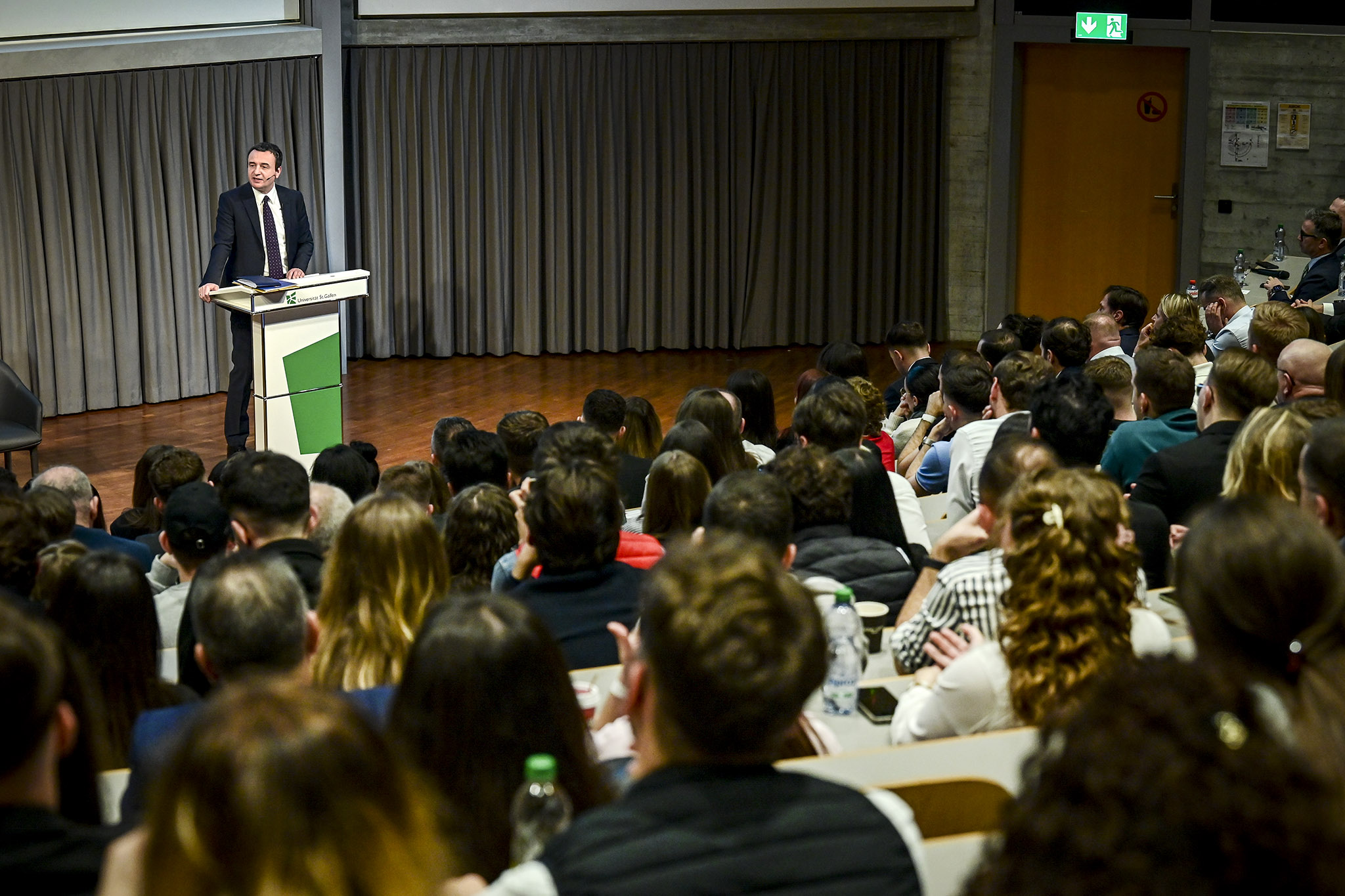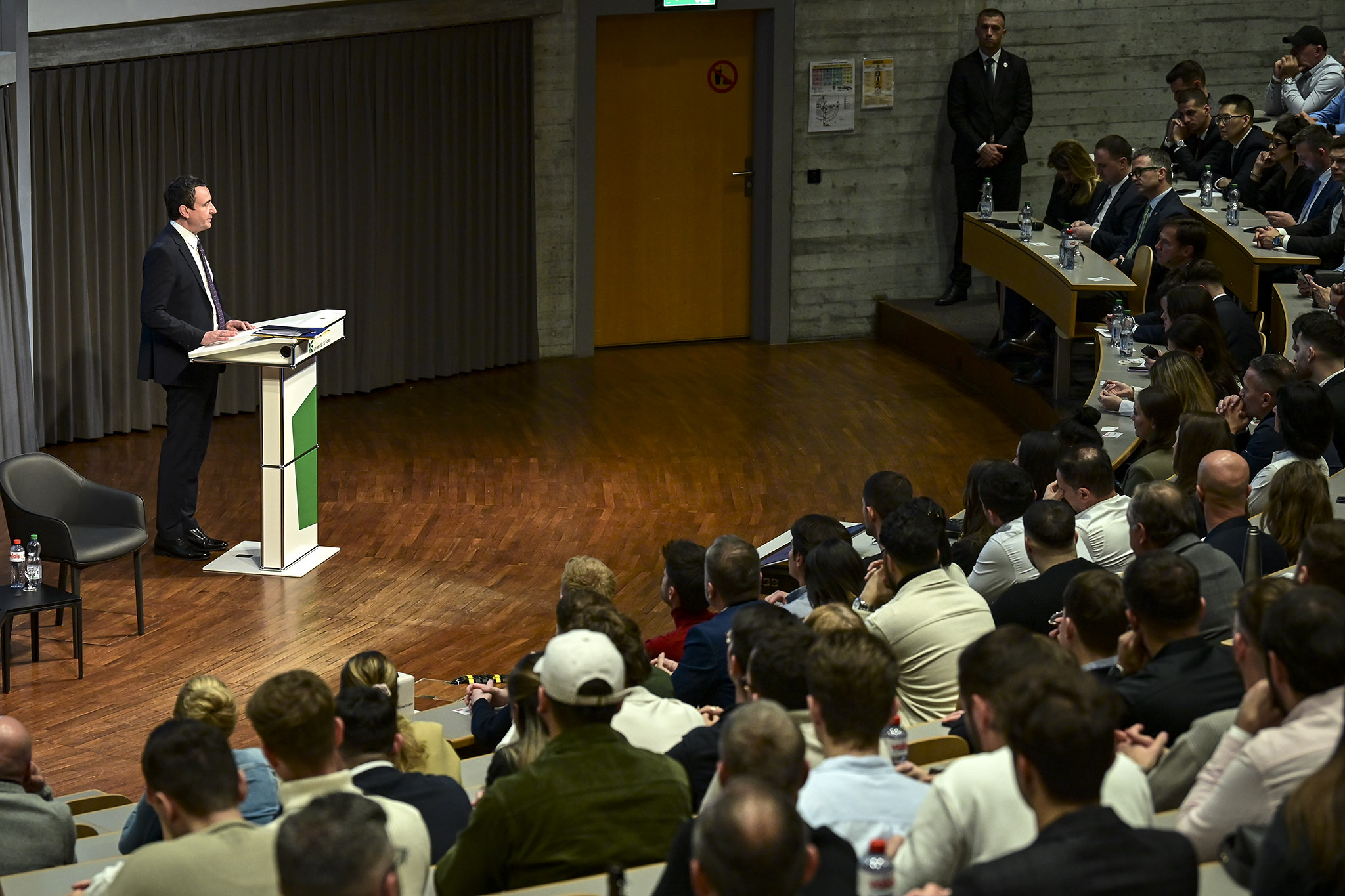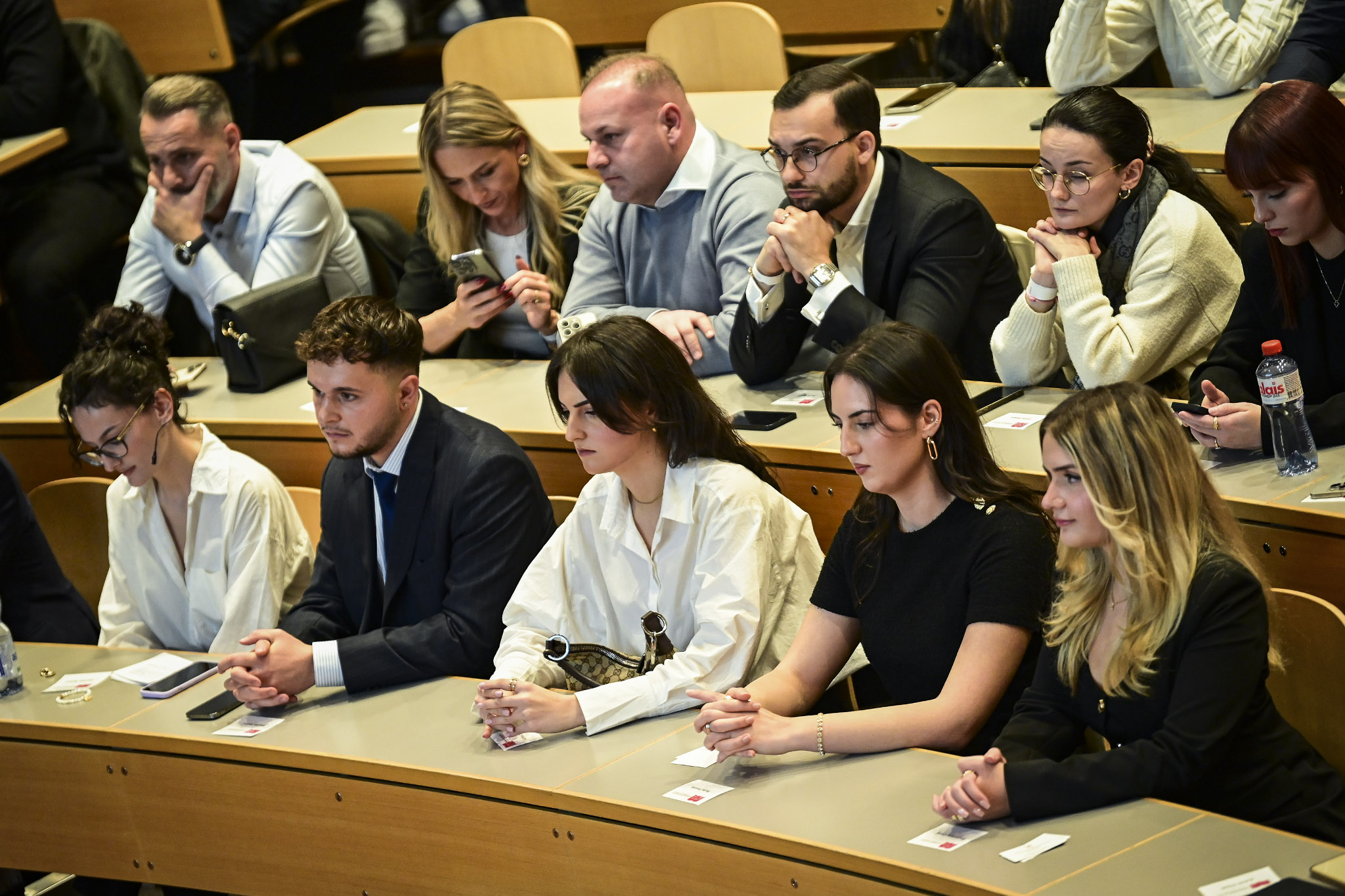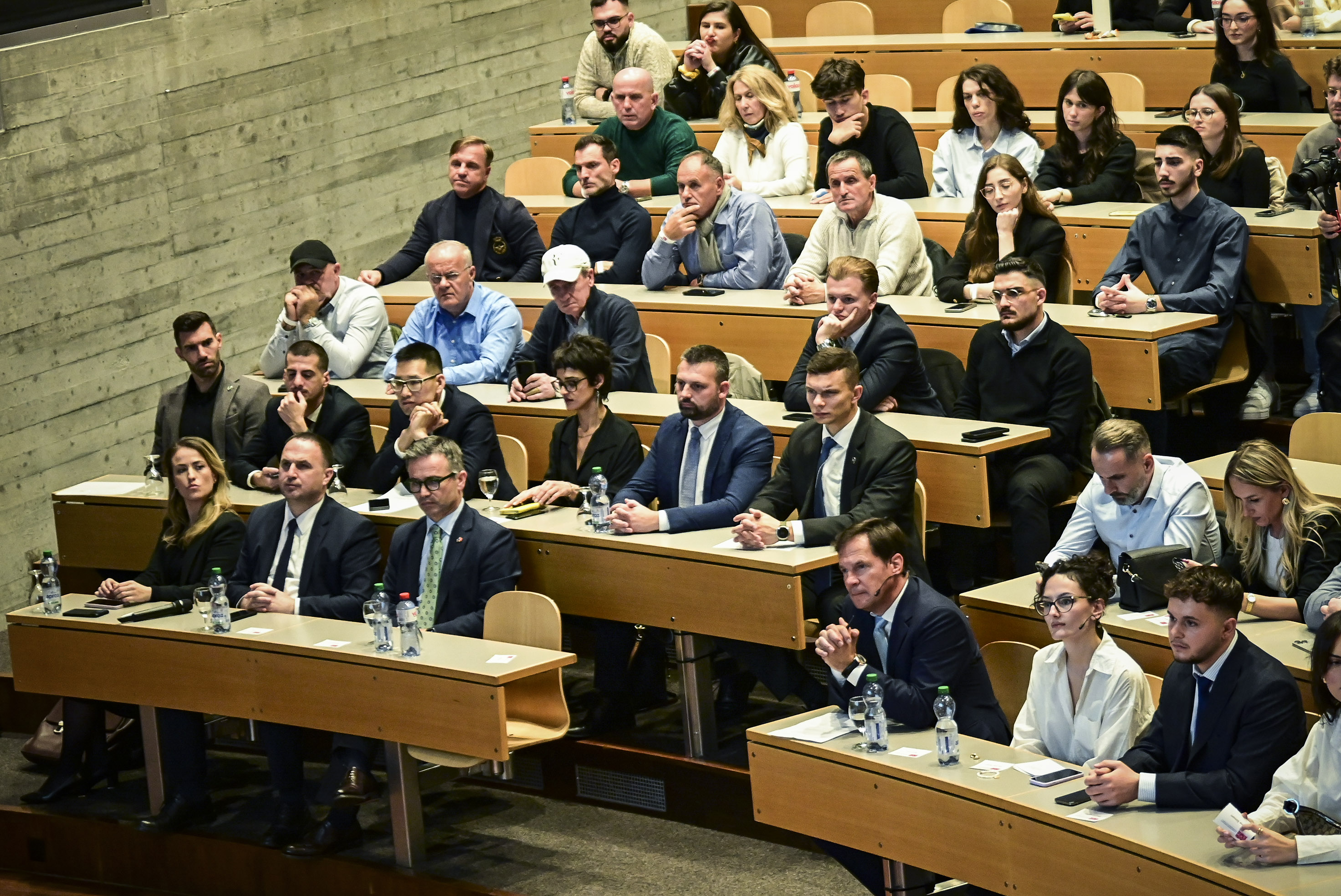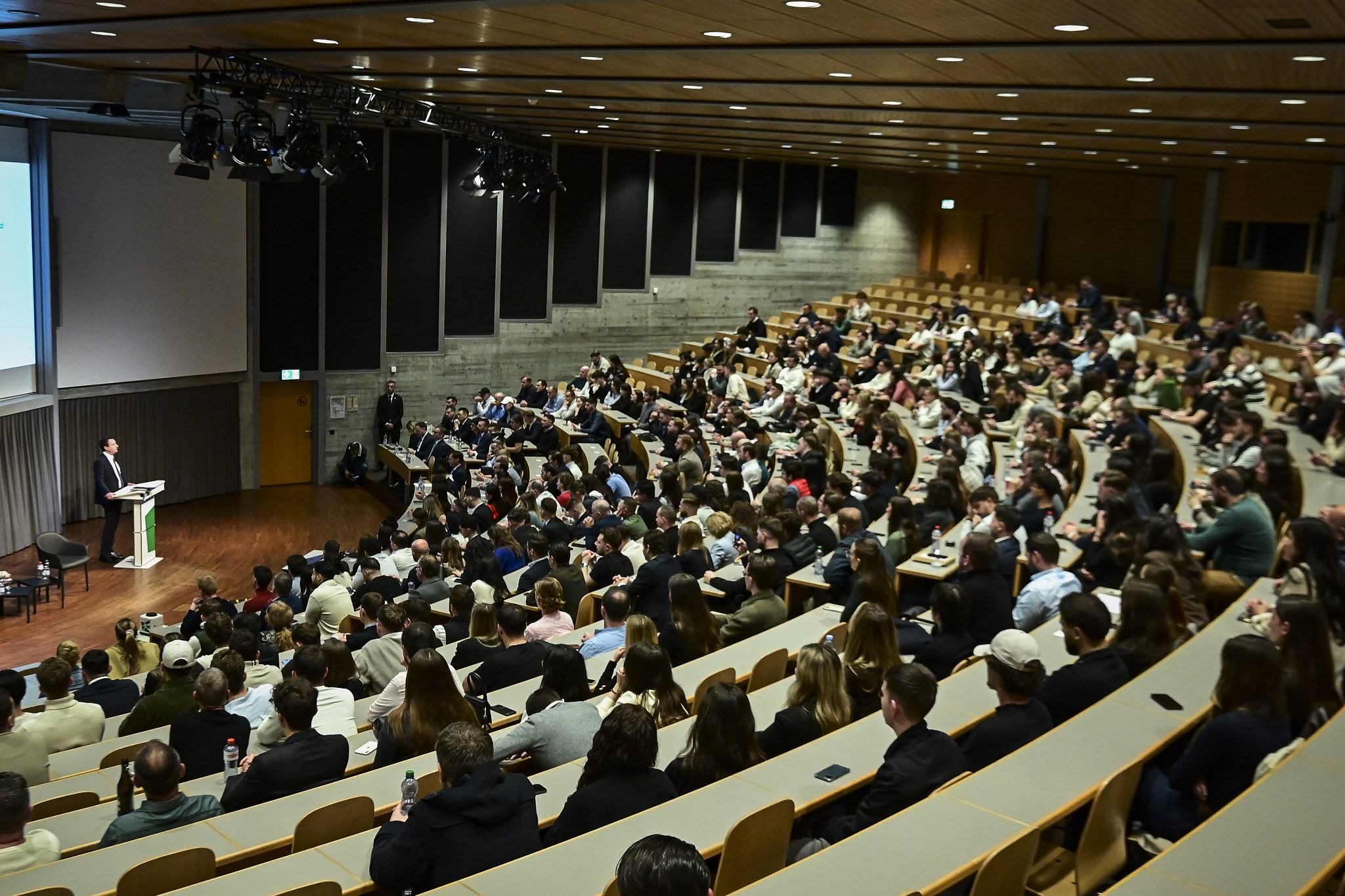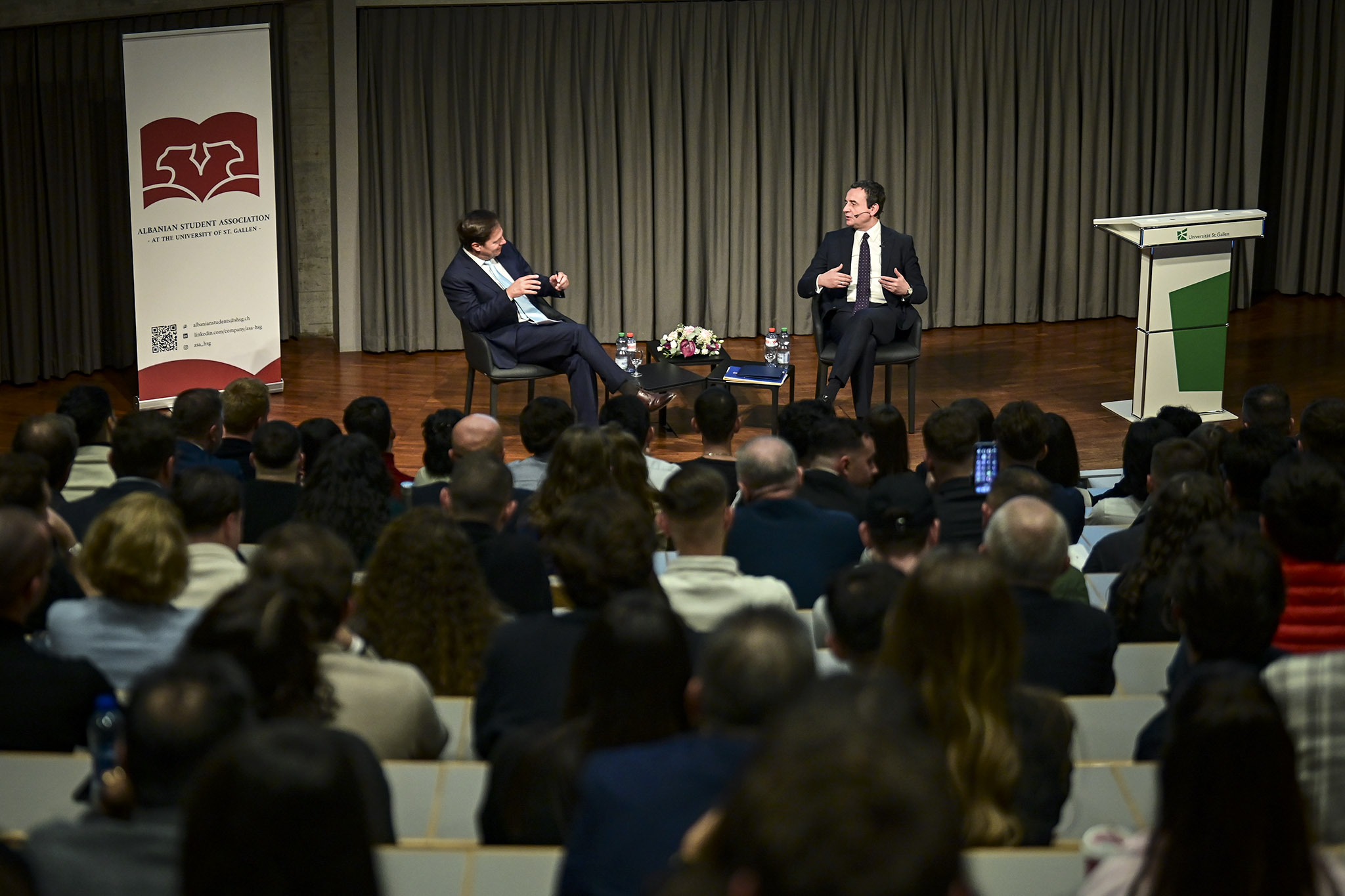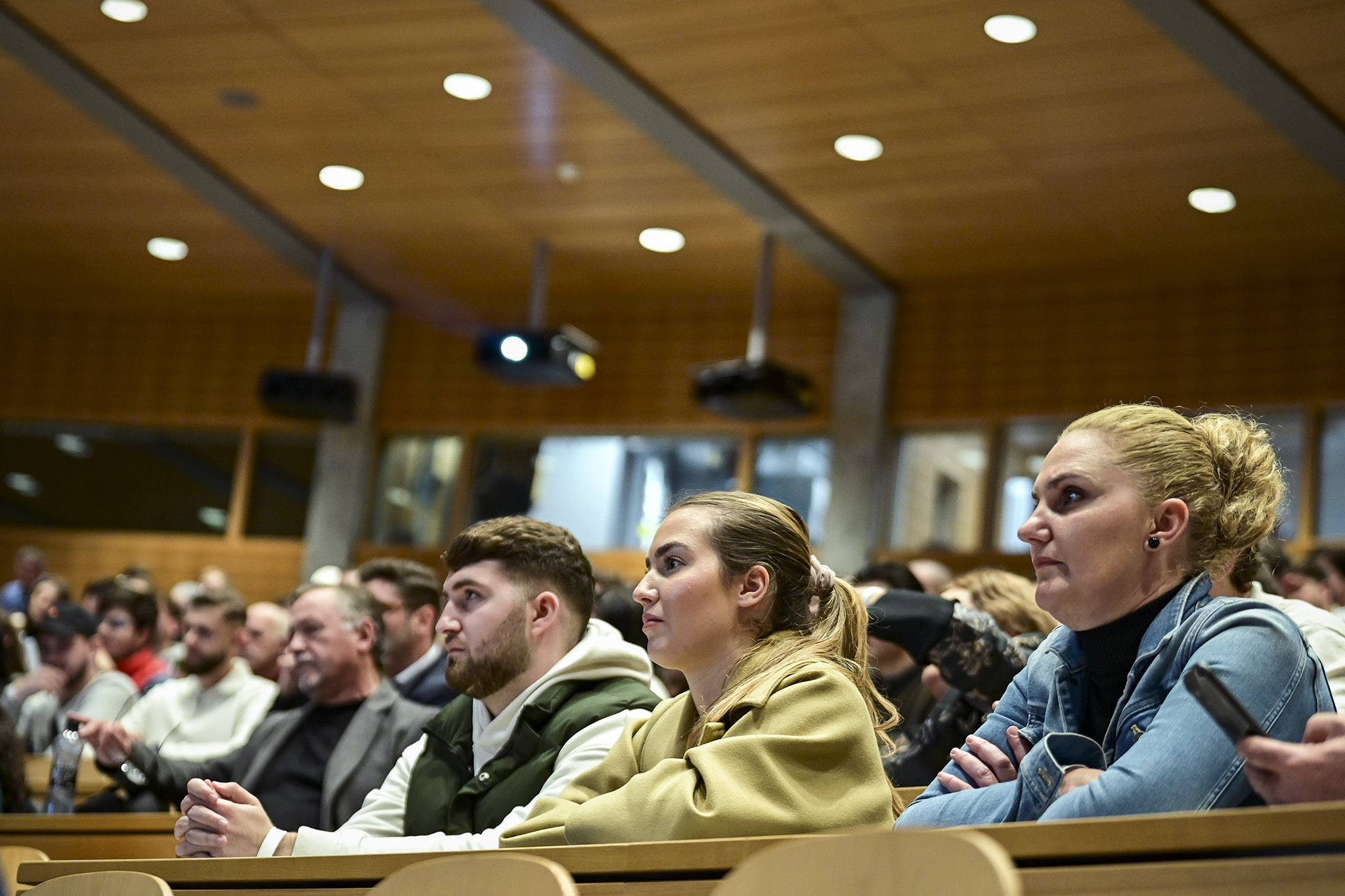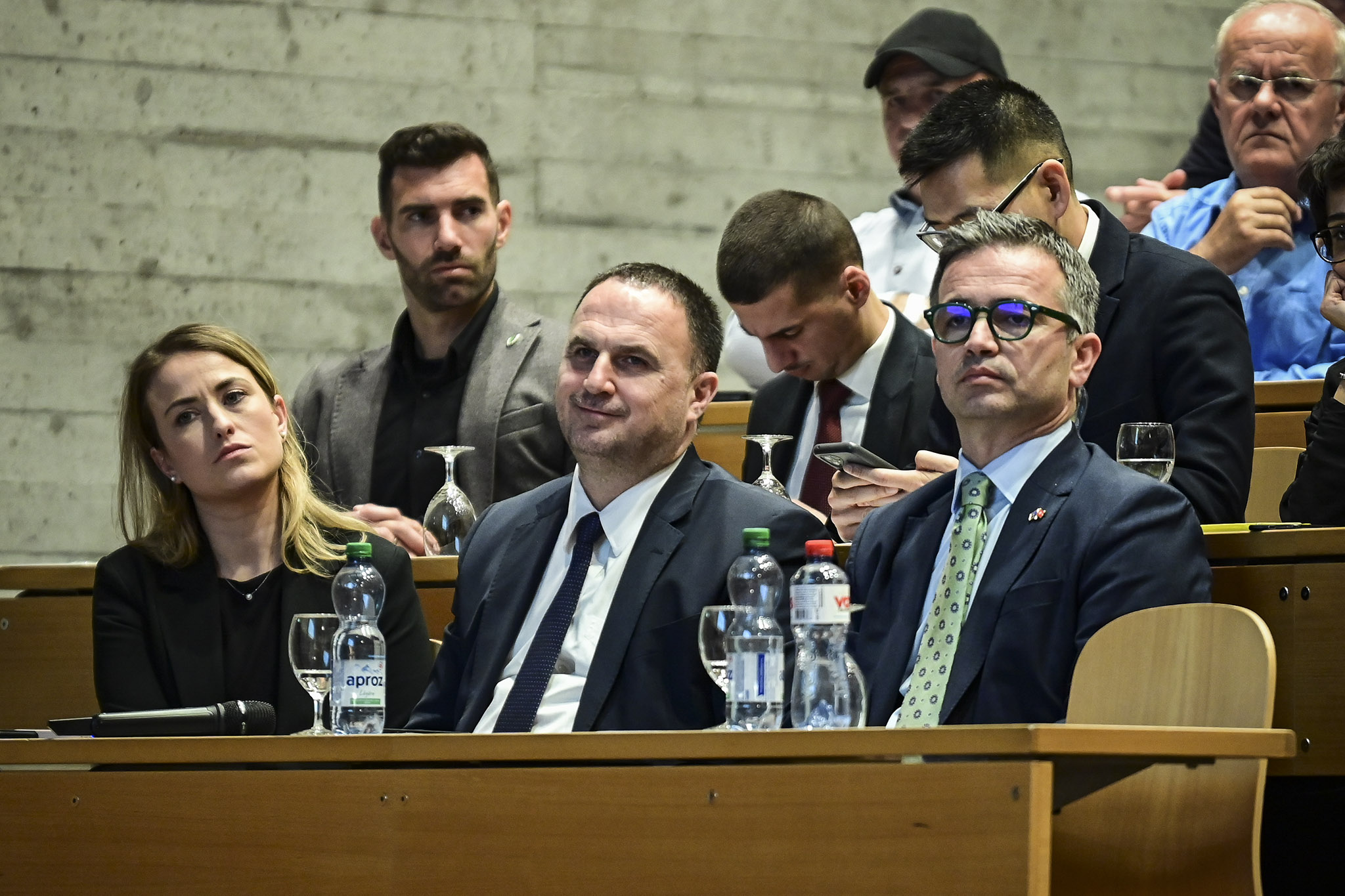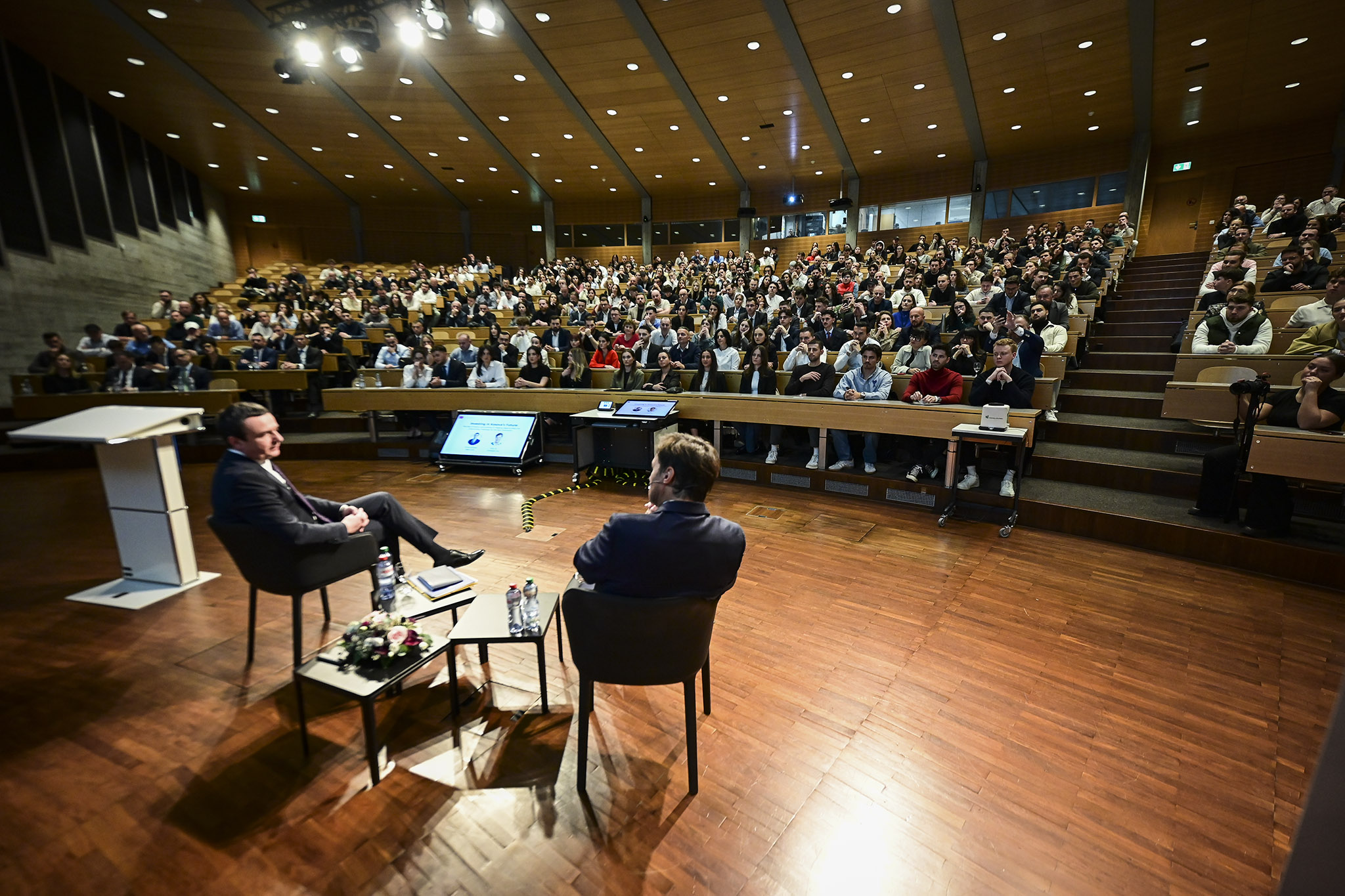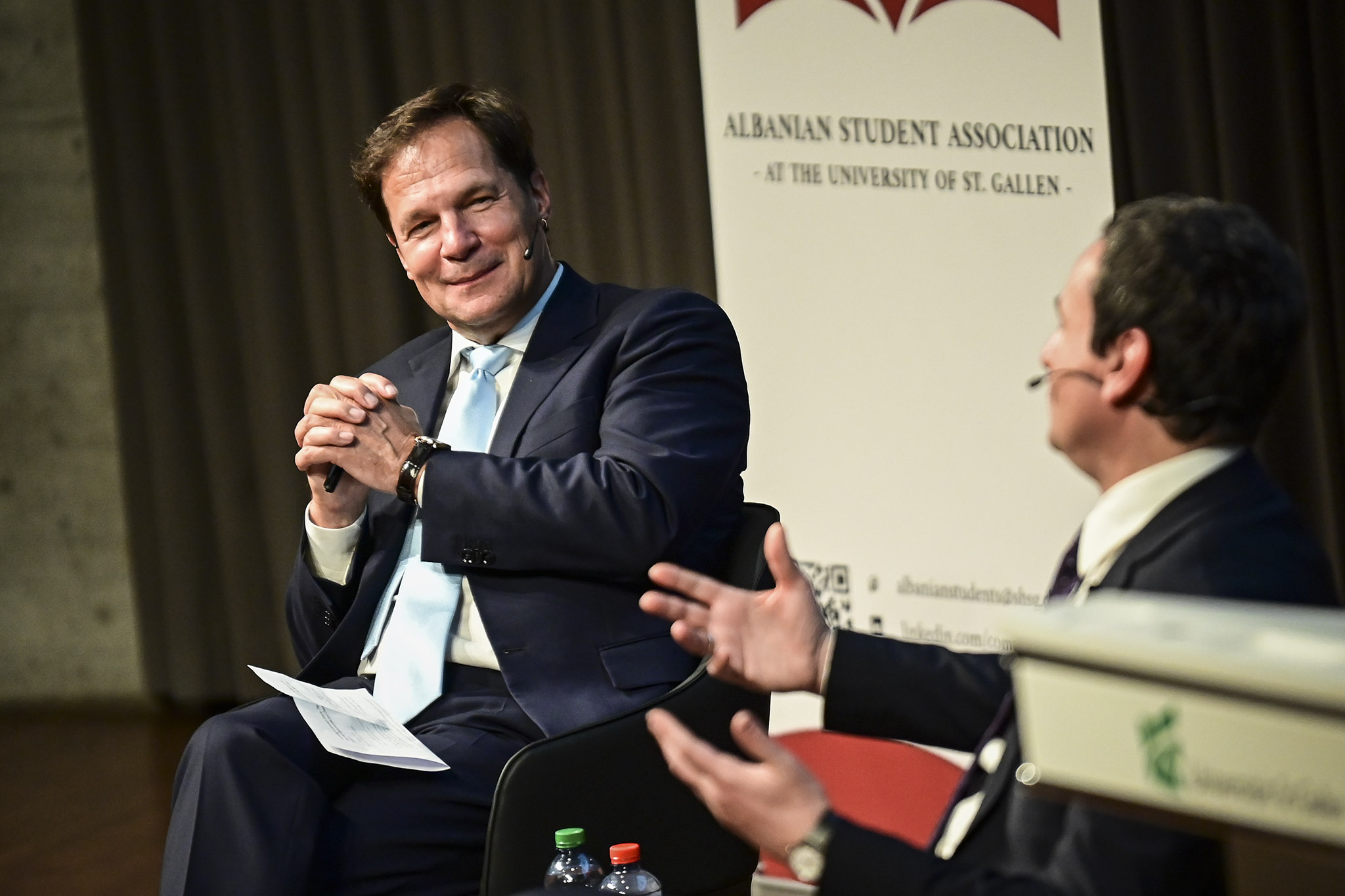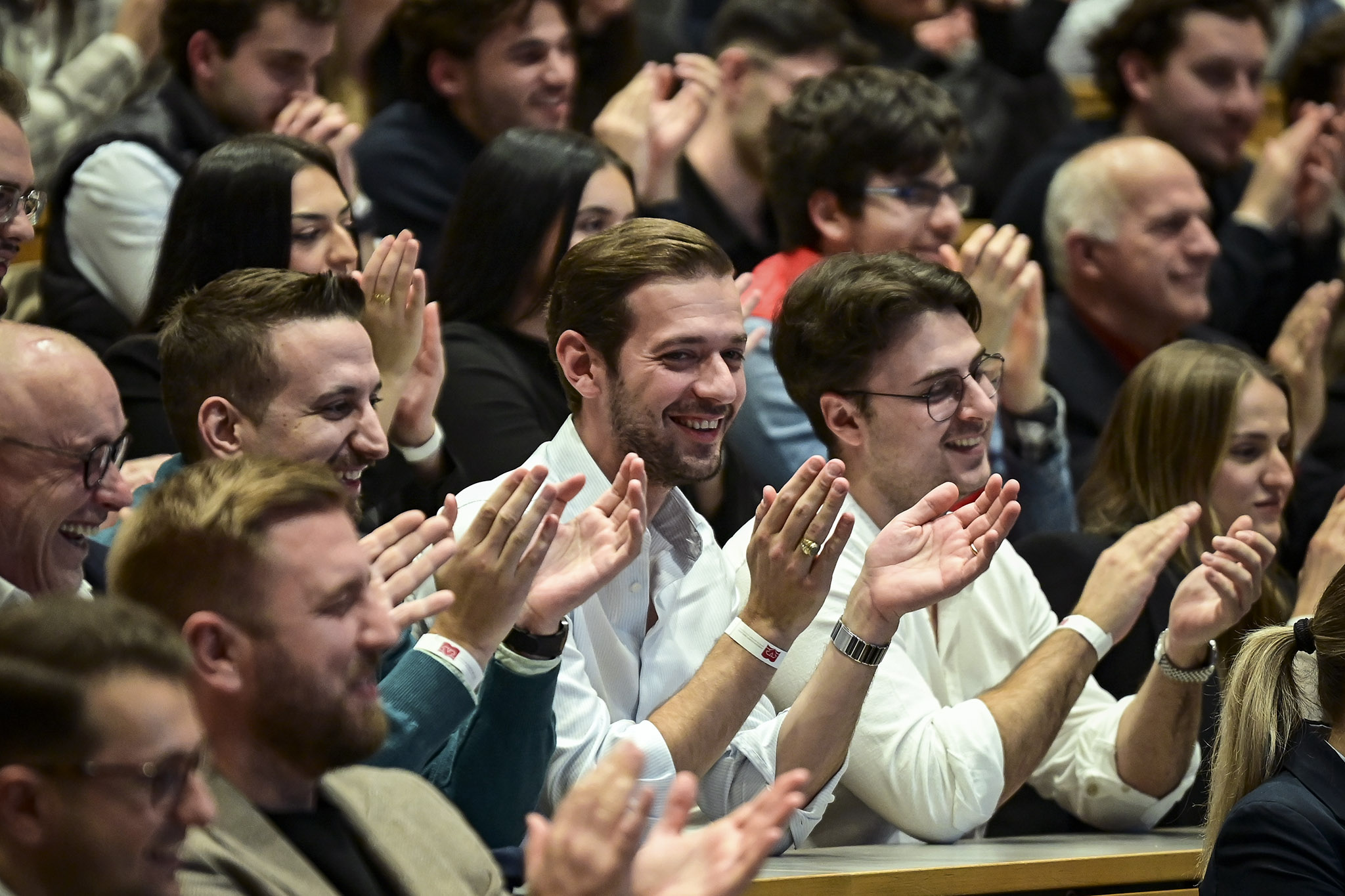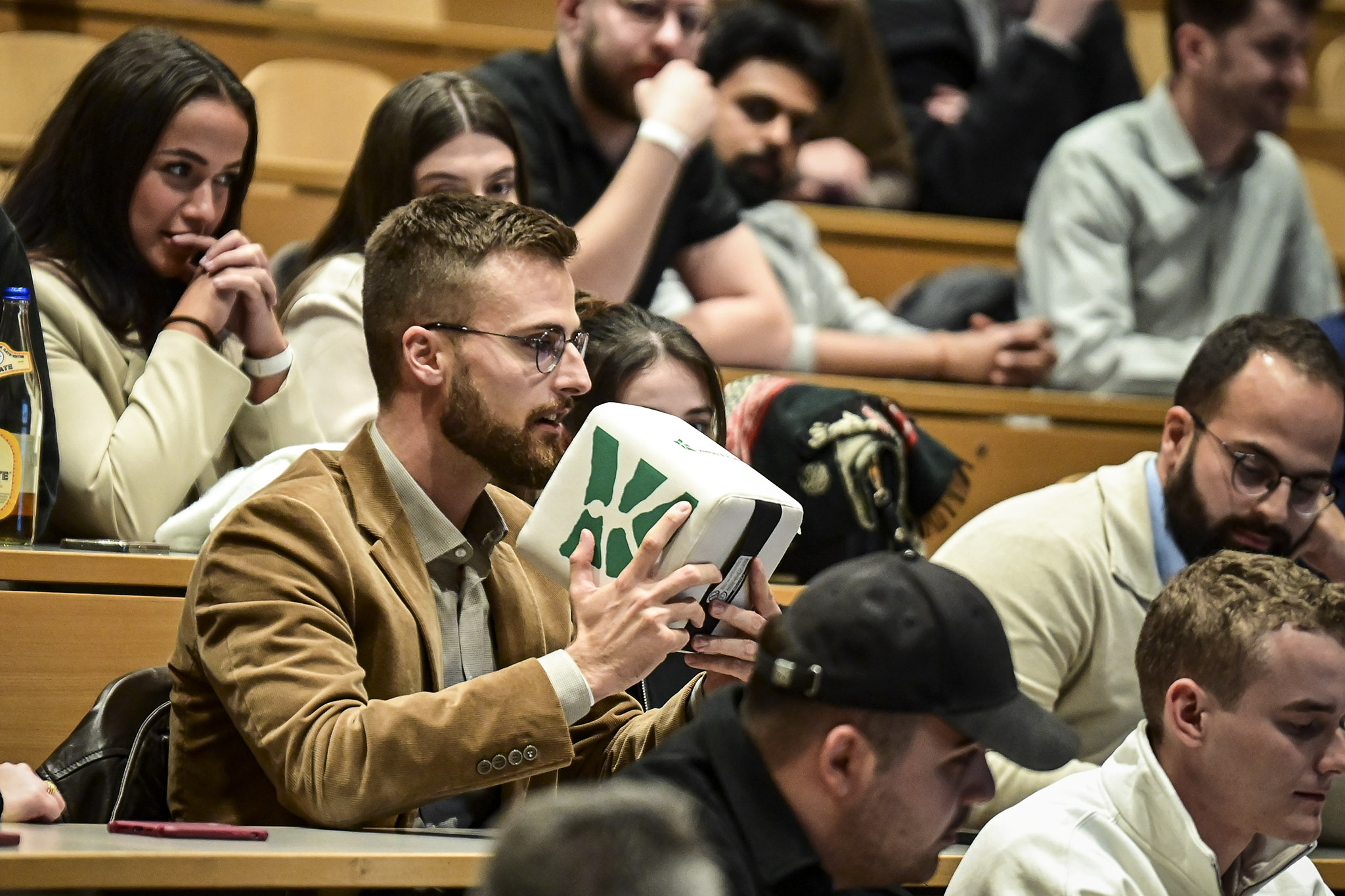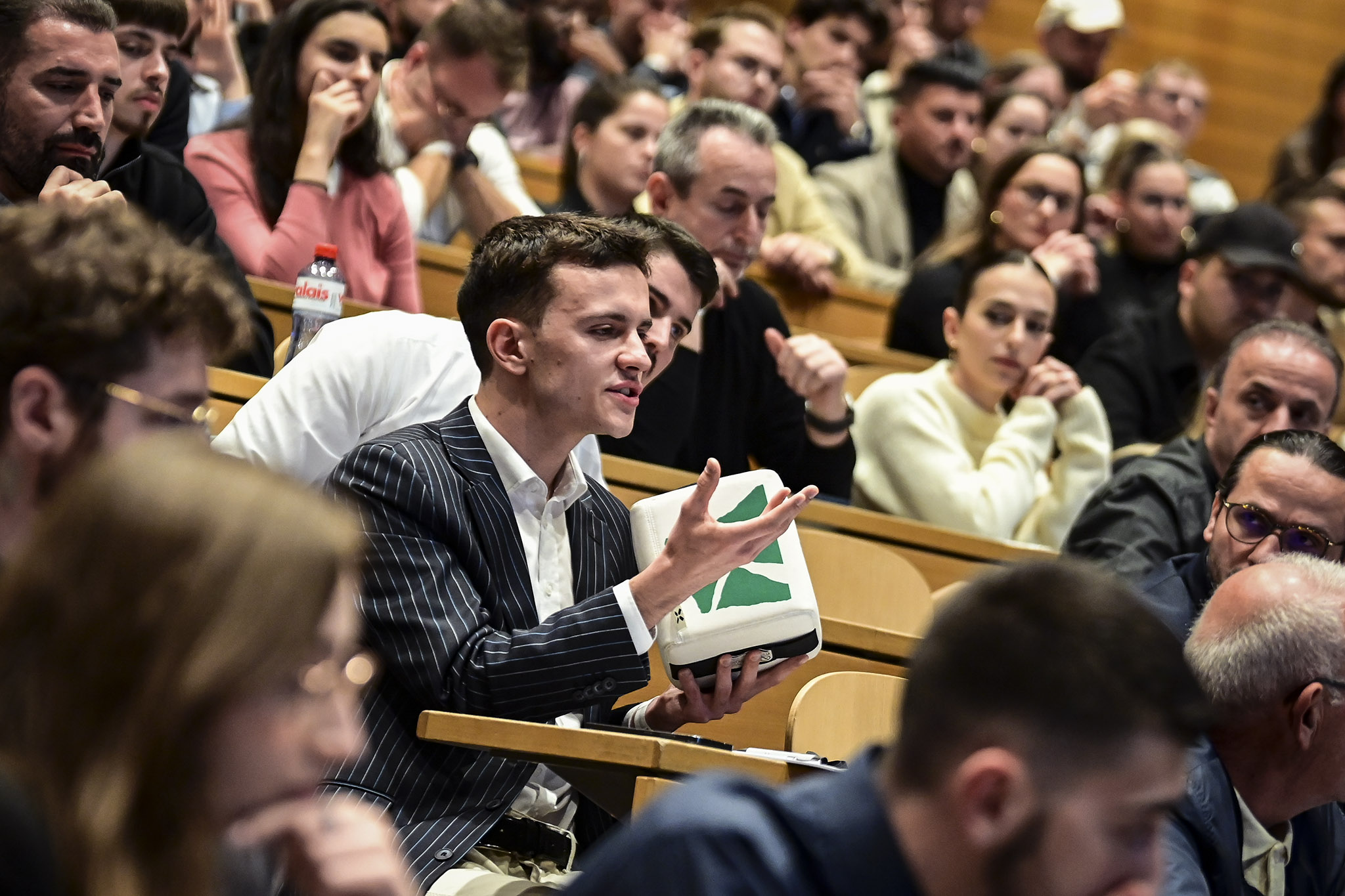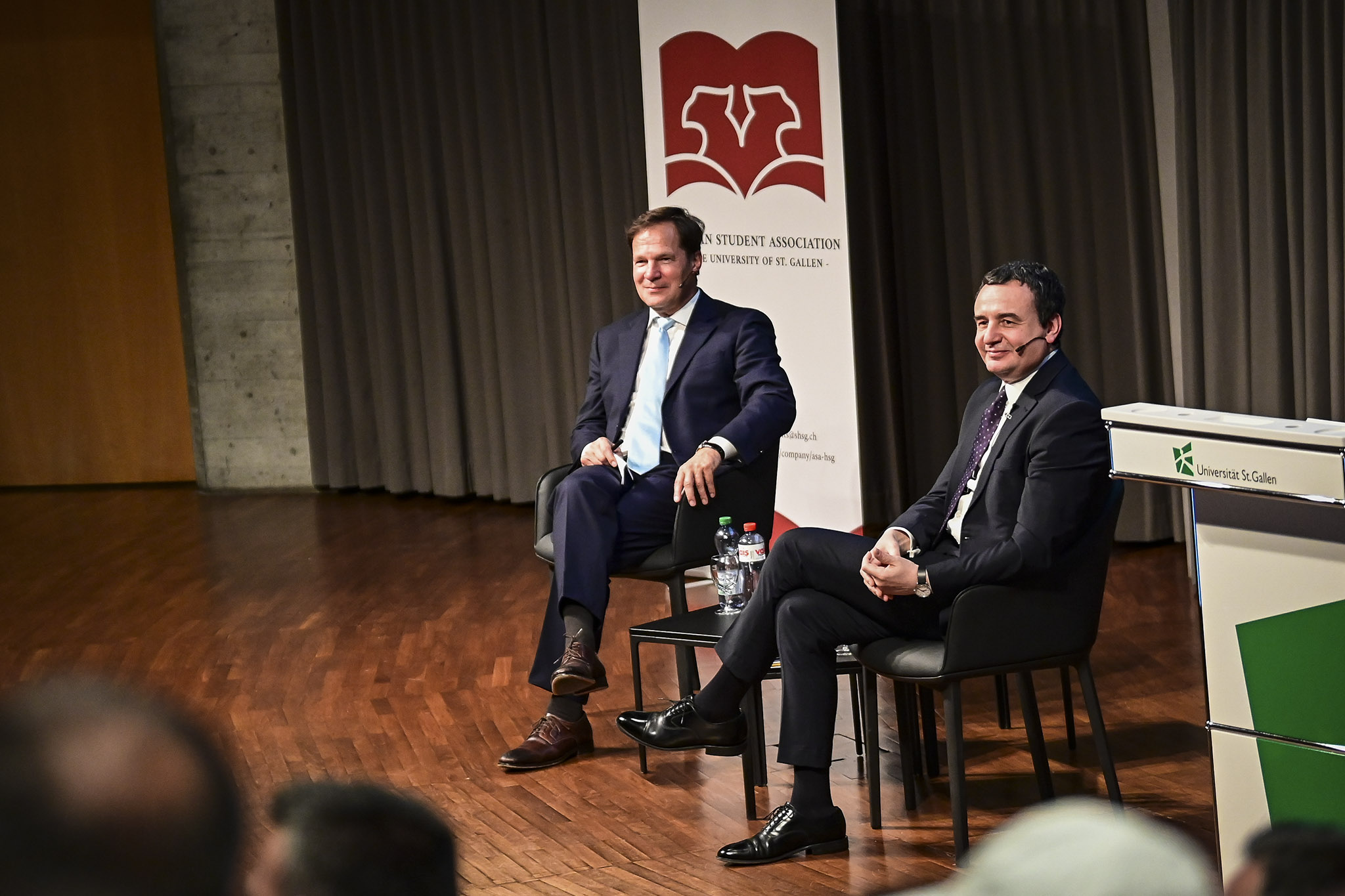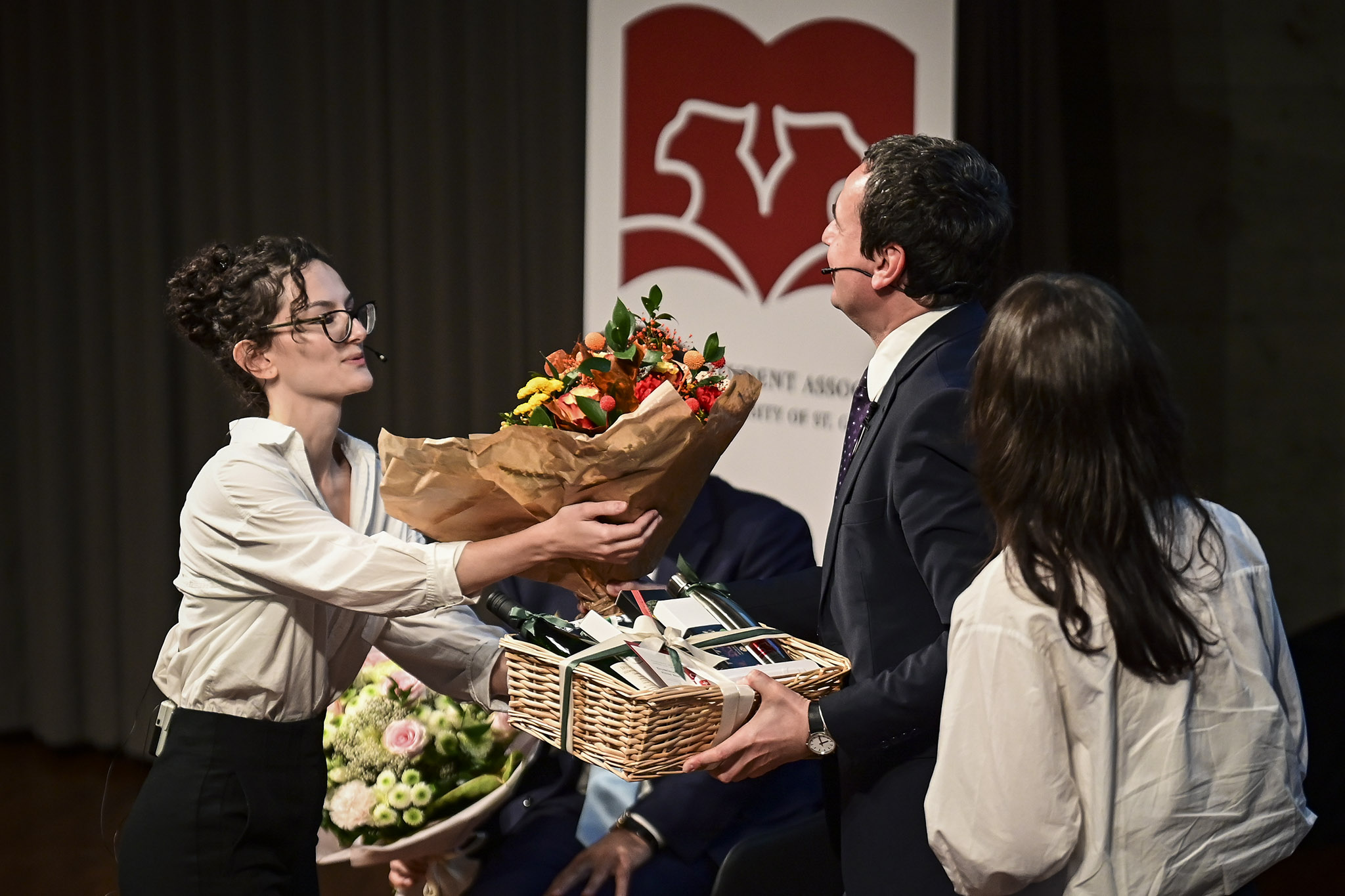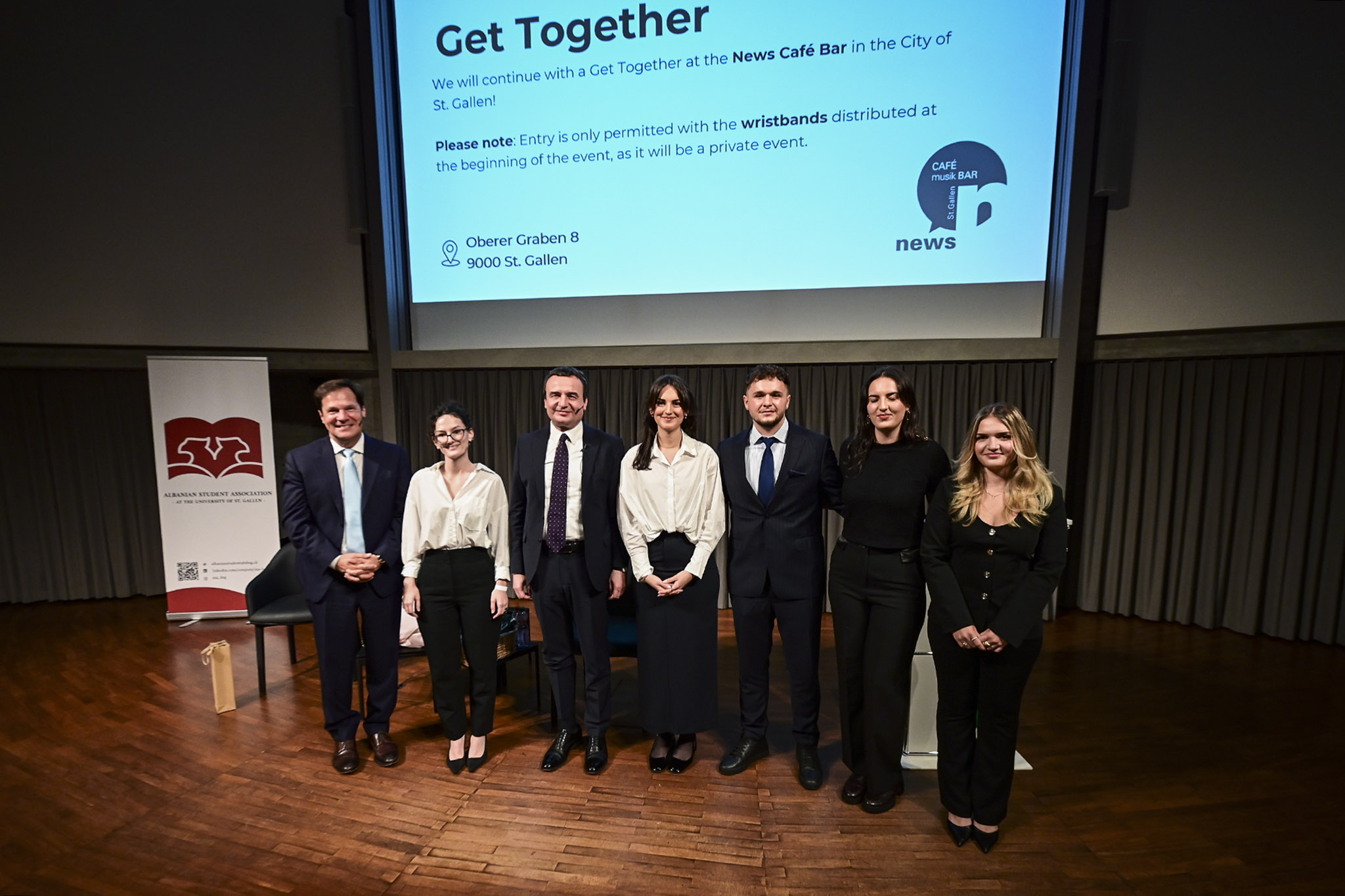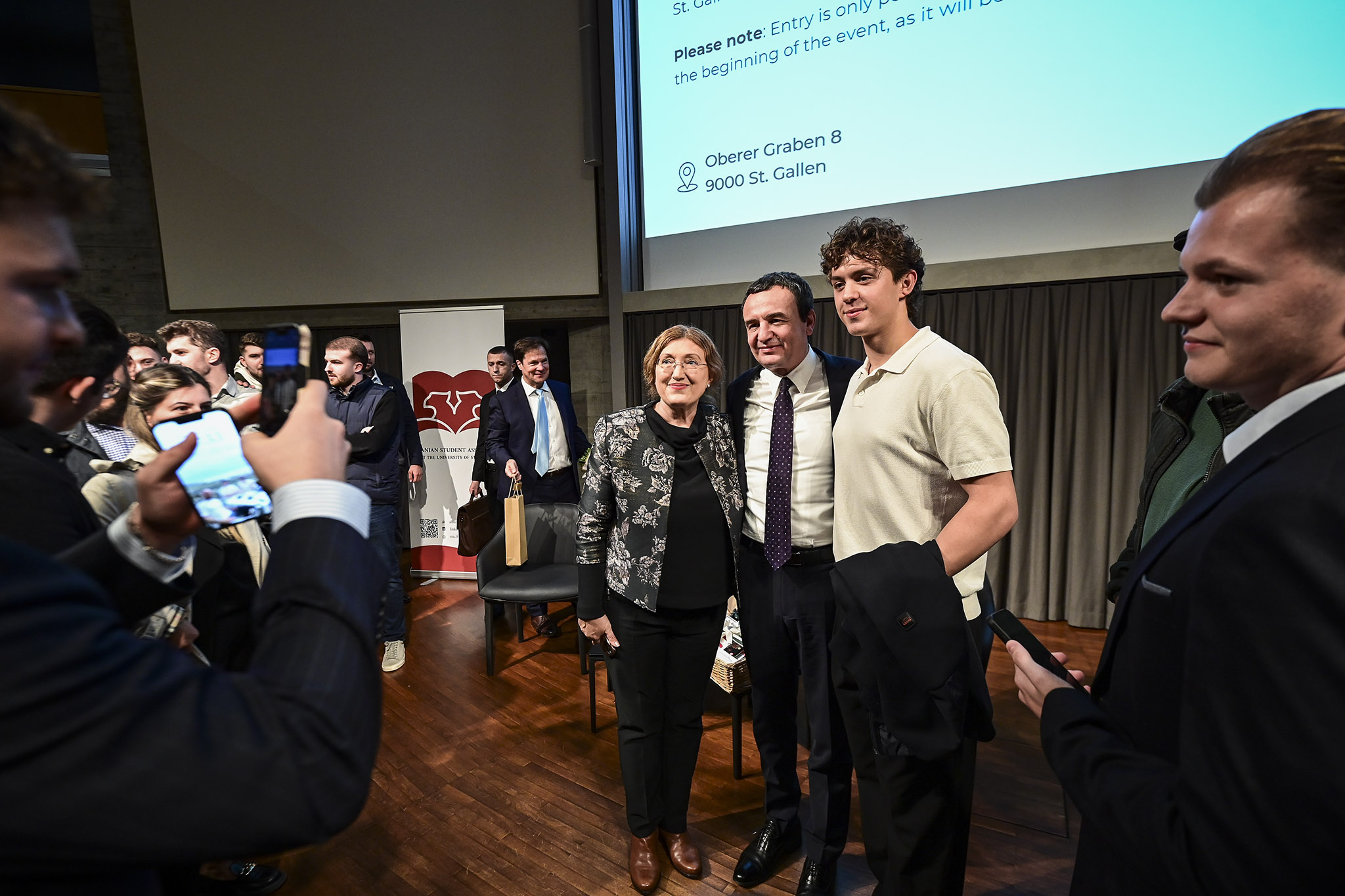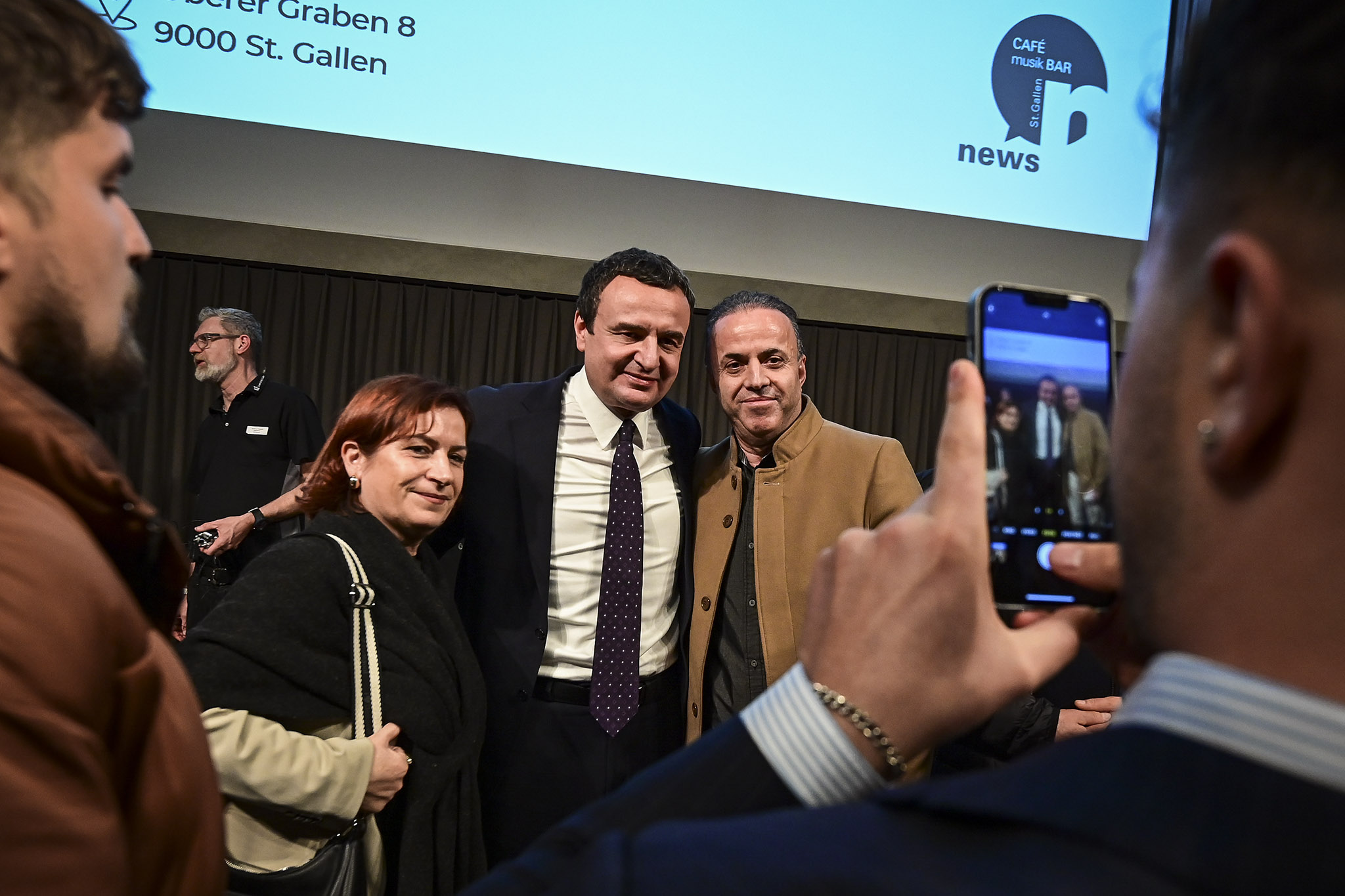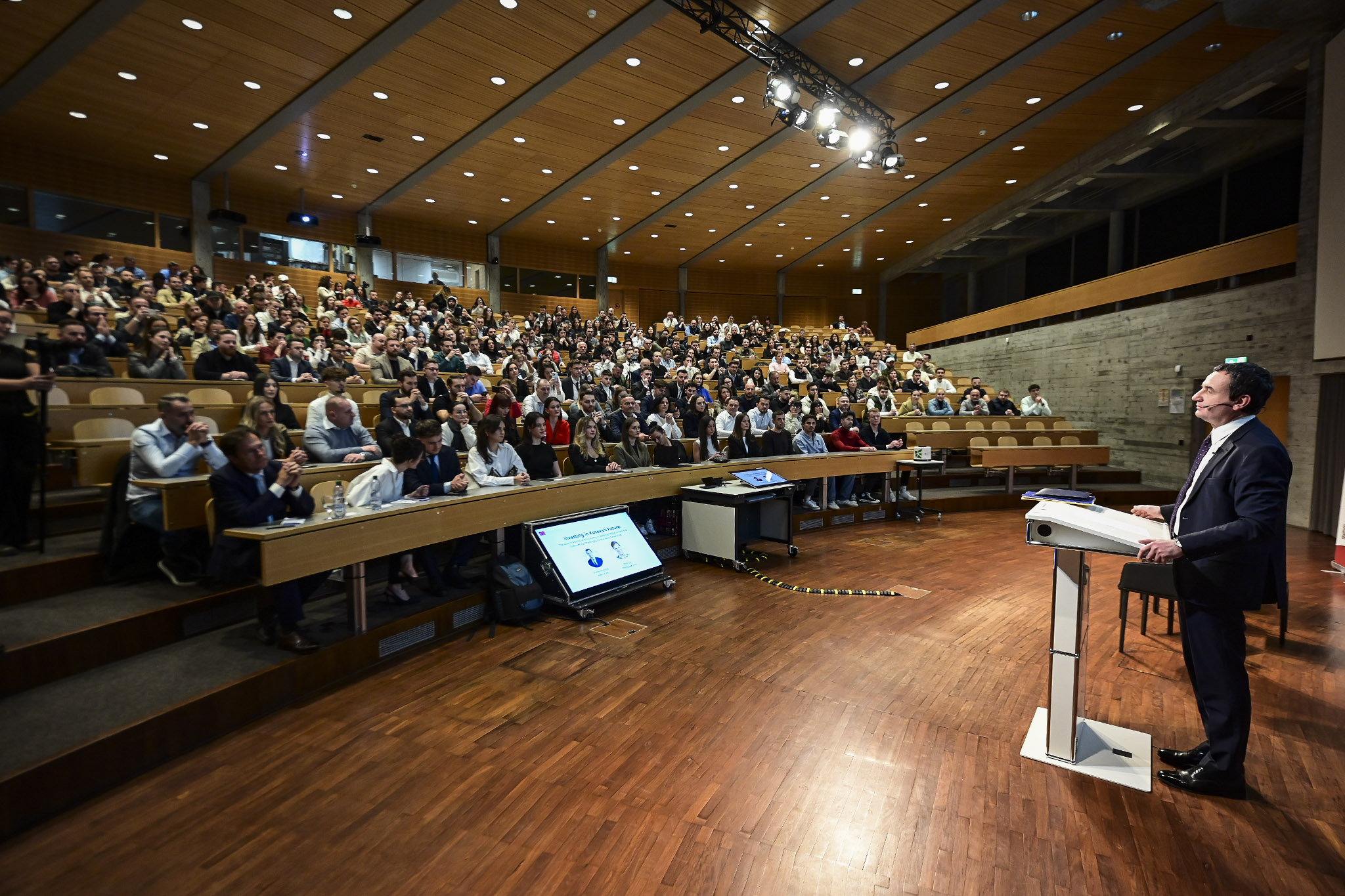Zurich, 1 November 2024
Last night, at the invitation and organization of the Association of Albanian Students, the Prime Minister of the Republic of Kosovo, Albin Kurti, held a lecture for students of the University of St. Gallen (HSG) and had a discussion and conversation with the well-known researcher of international relations, Prof. Dr. Christoph Frei, on the topic “Investing in the future of Kosovo: the role of politics and economics in shaping opportunities and overcoming challenges for future generations”.
In his address, he spoke about the internationally recognized democratic progress and economic growth, as well as the connection between them. Prime Minister Kurti argued before the students that the Republic of Kosovo offers a case and study example for the thesis of the Nobel laureates in economics, Daron Acemoglu, Simon Johnson, and James A. Robinson, given that the progress of our country in recent years has shown precisely that the strengthening of democratic institutions can bring economic benefits.
What makes our country a good example for social scientists, the prime minister said, is the fact that our country highlights the causal link by which democratization efforts can lead to economic benefits.
“First, foreign companies are more willing to invest in a country where they are not forced to pay bribes to public officials in order to enter the local market. Second, citizens and businesses are more willing to pay taxes when they know their money will be spent responsibly by the state, rather than lining the pockets of corrupt politicians and their cronies. And third, when people are optimistic about the direction of the government and the country, they tend to spend rather than save. In all three of these areas, our reforms have helped push forward our economic progress”, said Prime Minister Kurti.
In addition to these three factors, the prime minister singled out one of the four factors in the case of Kosovo: social democracy.
“For us, a fully democratic society is not only a society that uses majority decision-making procedures without corrupt influences; a democratic society is also one that ensures a wide distribution of opportunities and social resources among citizens, as completely equal members of society”, said Prime Minister Kurti.
On this occasion, he mentioned the policies, measures and programs through which the economic growth has been divided and redistributed to the citizens as they are; maternity and child allowances, free public education, scholarships for girls and women students and students from non-majority communities, investments in energy efficiency, increases in public sector salaries and pensions, increases in the minimum wage, employment measures for young people, investments in health and public services, and opportunities and government support for the diaspora to invest in Kosovo.
After the address, Prime Minister Kurti answered the questions raised by the students, as he thanked them heartily for the opportunity to talk and for the warm hospitality.
Prime Minister Kurti’s complete speech:
Professor Dr. Christophe Frei,
Honored faculty and students of the University of St. Gallen,
Representatives of the HSG Albanian Student Association,
Distinguished guests,
Zonja dhe zotërinj,
Motra dhe Vëllezër,
Mirëmbrëma të gjithëve,
Thank you for having me here tonight. It gives me a great pleasure to address you on the topic of this event, “Investing in Kosova’s Future: The Role of Politics and Economy in Shaping Opportunities and Overcoming Challenges for the Next Generation”. This is an important and timely subject, and I cannot think of no better place to reflect on it than here, at the University of St. Gallen, one of the preeminent universities of economics, finance, and business in the world. And I am especially grateful to have Professor Frei, the distinguished scholar to facilitate and organize this event and have him as an interlocutor being a scholar of politics and international relations.
The title of this event at least one big thing gets right: When it comes to a country’s progress, politics and economics are closely intertwined. The leaders of autocratic regimes such as Russia and China would like the world to believe that their mode of government is the most conducive to economic growth, due to the supposed stability that such regimes are able to offer. But we now know that they are wrong, thanks also to the cutting-edge research of this year’s Nobel Prize laureates in Economics: Daron Acemoglu, Simon Johnson, and James A. Robinson. According to their findings, countries that have democratized have increased their GDP per capita by about 20 percent over the two or three decades following their democratization. As Acemoglu and Johnson write in a recent book, I quote them “the evidence is clear that democracy is good for economic growth, for delivering public services, and for reducing inequality in education, health, and opportunities.” Thus, when it is said that economic advancement and democratic progress go hand in hand, this is not simply a political slogan, or what we would merely like to believe. It is an empirical fact.
I want to argue that the Republic of Kosova provides an instructive case study for Acemoglu, Johnson, and Robinson’s thesis. Our country’s progress over the past few years shows precisely how strengthening democratic institutions can yield economic rewards.
Kosova’s improvement on a range of democratic measures has been confirmed by multiple international organizations in the last few years. For example, during our Government’s mandate, we’ve improved 21 places in Transparency International’s Corruption Perception Index. We’re first in the Western Balkans and among the top nine countries in the world in terms of democratic progress, according to the V-Dem Institute’s Electoral Democracy Index. Gallup’s ranking this year on Law and Order lists Kosova as first in the Western Balkans, second in Europe, and fifth in the world. And similarly, we are first in the Western Balkans, second in Europe, and third in the world for improvement in civil liberties and political rights, according to Freedom House’s 2023 report.
Our economic progress over the same period of time has followed a similar upward trajectory. GDP growth has averaged 6.2% over the past three years, the highest in the region. We’ve doubled exports. FDI has likewise increased by 134% during our mandate thus far; and a report this August by fDi Intelligence, sponsored by the Financial Times, ranked Kosova 2nd in the Emerging Europe — and 5th in the world — for attracting the highest level of FDI relative to GDP. From the first quarter of 2021 to the first quarter of 2023, the unemployment rate fell from 25.8% to 10.7%. This is not only the result of new job creation, but it is also due to businesses that were once operating on the black market or in the grey zone, finally registering themselves with the state. And all of this has led to a remarkable 2/3 increase in tax revenues in the past three years, with no major changes in fiscal policy.
It is therefore undeniable that democratic and economic progress in Kosova have gone hand in hand. But what makes our country a ripe example for social scientists is that it reveals something about the causal chain by which democratization efforts can lead to economic benefits. First, foreign companies are much more willing to invest in a country if they are not forced to bribe public officials in order to enter the local market. Second, individuals and businesses are more likely to pay their fair share of taxes when they know that their money will be spent responsibly by the state, rather than line the pockets of corrupt politicians and their relatives. And third, when people are optimistic about the direction of the government and the country, they tend to spend rather than save. In all of these ways, our democratic reforms have helped power forward our economic progress.
Besides these three causal factors, there is a fourth one that is perhaps more unique to Kosova — and also more interesting to the building of even more hopeful future but also to the philosophers, scholars, researches and economists in this audience tonight. Under our Government, democracy means much more than the narrow sense in which many people understand it. According to this narrow sense, democracy is simply a procedure for making decisions by majority vote, perhaps supplemented by other related procedural values, such as rule of law and anti-corruption.
However, our Government aspires to be democratic in a far broader sense as well: that of social democracy. For us, a genuinely democratic society is not just one that employs majoritarian decision procedures free from corrupt influence; it is also one that ensures a broad distribution of opportunities and social resources among citizens, conceived as fully equal members of society. Investing in Kosova’s future entails investing in the future of all of our people, without exception. It is this broader sense of democracy that the American philosopher John Rawls appealed to when he posited the ideal of democratic equality.
What exactly does the social-democratic ideal mean in practice for the citizens of Kosova today? It means that the Democratic Government works to ensure that everyone — especially those who are most in need — receives a fair share of the benefits from the economic expansion of the past few years. For instance, under our Government:
• families now receive subsidies to help ease the financial burden of raising children;
• bachelor’s and master’s students attend public universities completely free of charge;
• ethnic minority students, and female students studying Science Technology Engineering, Maths fields, are eligible for additional scholarship support;
• patients with cancer, diabetes, and other diseases have more of their expenses covered, due to a nearly tripled state budget line dedicated to the purchase of essential medicines; and they also benefit from our numerous acquisitions of the latest medical technologies;• households that invest in energy efficiency receive government support to defray the costs of this investment;
• essential workers such as doctors, teachers, firefighters, police officers, and soldiers have all had their salaries nearly doubled or more than doubled;
• than the minimum wage for private and public sector workers has almost tripled;
• pensions for all categories of recipients have been substantially increased;
• businesses are rewarded for hiring young people from the age of 18–29 and people with no employed family members;
• and our highly successful diaspora is now eligible for government support to invest in Kosova.
These are only a small fraction of the ways in which the ideal of democratic equality has directly and tangibly improved the life of the average Kosova citizen.
What is seldom appreciated is that, as a conceptual matter, even the narrow, procedural sense of democracy is inseparable from a deeper ideal of equality. Take, for example, the most basic principle of procedural democracy: one person, one vote. This is a fundamentally egalitarian principle. At the moment when some people are given more votes than others, we no longer have a genuinely democratic society — not even in the narrow, procedural sense. What this brings out is that both procedural democracy and social democracy rest on the very same fundamental ideal: the ideal of citizens as equal persons.
The example of Kosova helps to demonstrate that the two notions of democracy are also mutually reinforcing each other in practice. When all citizens have an equal voice and an equal vote in electing their political representatives, the government is motivated to ensure that the benefits of economic growth are widely distributed-throughout the population leaving no one behind. And conversely, when these benefits are widely distributed, citizens are far less likely to turn to autocratic figures who promise to solve their problems while undermining democratic institutions and the rule of law and promising shortcut simple solutions.
This last point is especially important to bear in mind, at a time when the rise of far right-wing extremism threatens to engulf some of the world’s oldest democracies. In contrast to these countries, Kosova is a new democratic state, the youngest in Europe, with an over 90% mono-ethnic population in a region with a history of war, ethnic cleansing, and genocide. And yet, our people are led by a Government completely untouched by the anti-democratic politics and hateful rhetoric that have become all too common in more established and wealthier Western societies. One major reason for this, I believe, is that no social group has been forgotten by our Government — no group has been left behind, embittered at their inferior standing, searching for someone else to blame for their troubles and their daily struggles.
Dear friends,The decrease in social inequality that has resulted from the distribution and redistribution of economic growth, has generated a positive feedback loop — not a vicious but a virtuous circle. A more even distribution of resources leads to still greater economic growth, which can again be widely shared among the entire population. This is a pattern we have seen repeatedly in our economic data over the past four years. In such circumstances, there is a constantly growing middle class, and no social or ethnic tensions for dictators or demagogues to exploit for political gain. Fascism has no refuge, no foothold in our political life and social culture. To the contrary, the rising economic tide has truly lifted all boats, and this has made popular support for democratic institutions in Kosova stronger and more widespread than ever before.
Thank you very much, and I look forward to your questions.
Last modified: November 1, 2024
